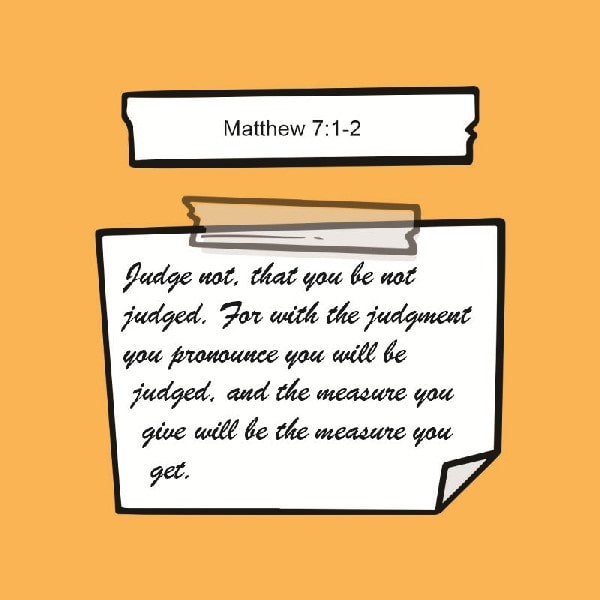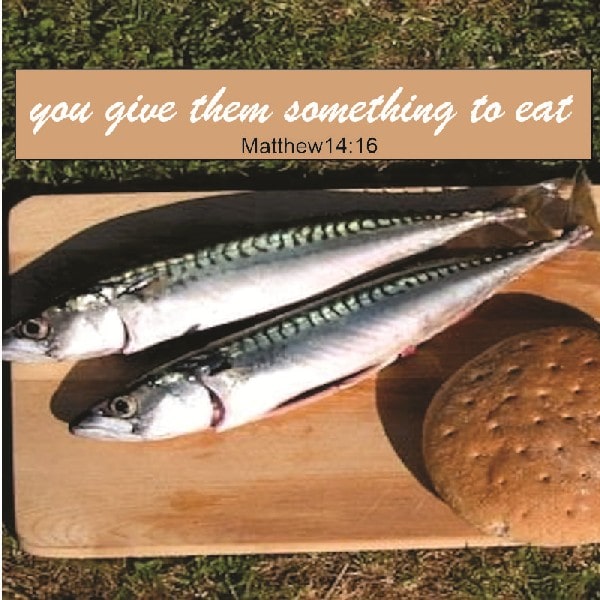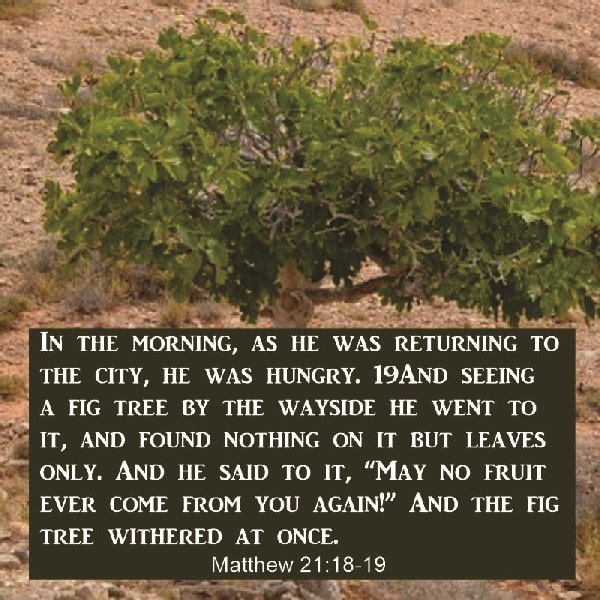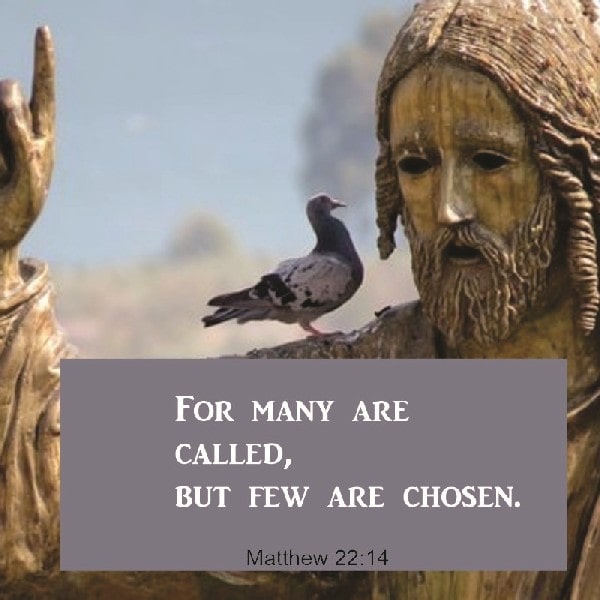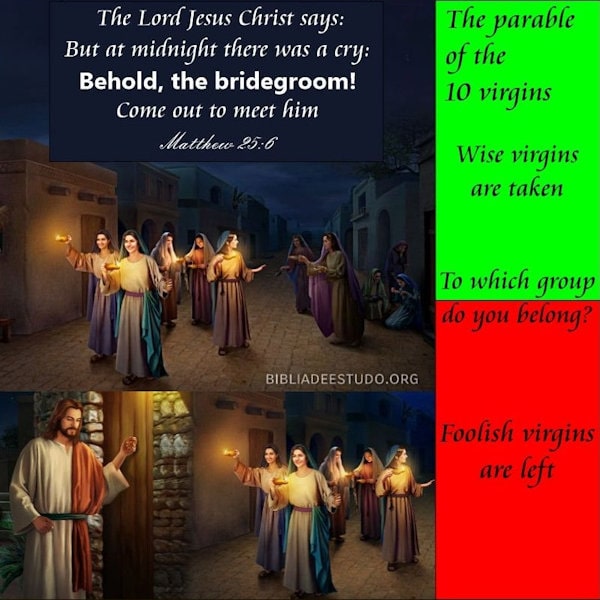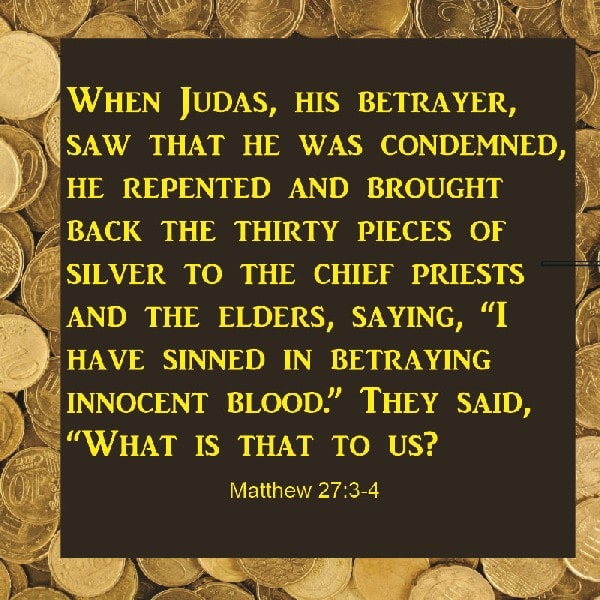Bible study Daily, explanation and encouragement - Matthew
Chapter
Obviously, Jesus could not be accepted as the Messiah unless there could be proof through genealogical records that He was the son of David, since the Jews believed that their Messiah would come from the royal lineage of the greatest of the Kings of Israel, and that He would be born in Bethlehem, David's hometown.
However, Let us talk a little about a figure who is somewhat overlooked: Joseph. He has such noble and exemplary attitudes for many men.
Joseph was Jesus' adoptive father, but not his physical father. But Mary was his real mother.
The story of Jesus is told with great beauty and delicacy. Mary, his mother, was betrothed to Joseph.
Before the wedding, however, she became pregnant by the power of the Holy Spirit. Joseph, her fiancé, was a righteous man and decided to break the union in secret, because he did not want to shame her with a public separation (Matthew 1:18-19).
Jesus’ lineage does not go back to Mary, because the Jews always considered it from the man’s side, and Mary was also from the same tribe and family as Joseph, so they were both from the house of David.
Joseph was righteous. We can imagine what a great trouble and disappointment it was for Joseph to discover that someone he trusted was suspected of having committed treason. He must have thought…
Is this the Mary I know? How can we be deceived by those we think the best of! He is reluctant to believe it. It was too bad a case to be forgiven, and too clear to be denied. What a struggle must have been going on inside Joseph! But he avoided extremism, he did not want to make a public example of this. The Jewish law required that Mary had to be stoned to death (Deuteronomy 22:24). Joseph did not want that. How good it is to think about things as Joseph did here! We would make fewer mistakes, judgments or criticisms.
The solution Joseph found to avoid this extreme was to end everything in secret, that is, to give a bill of divorcement in front of two witnesses and keep it only between them. Being a just man, that is, a strict observer of the law, he would not have gone ahead with his marriage with Mary. But as a gesture of affection towards her, he did so secretly.
Joseph's deliverance from this problem was the visit of an angel (v. 20-21). He did not know exactly what to decide, but God graciously indicated what to do.
To always receive God's guidance, we must think about it, consult ourselves. God will guide the one who reflects and not the irrational.
Matthew 1:18

Joseph, Mary's fiancé, was a fair man and decided to break the union in secret, as he did not want to embarrass her with a public separation. This text provides us with a wonderful understanding of what it means to be "just". According to Jewish customs, Mary was bound to Joseph as a wife, although they did not have sexual relations. Engagement represented a legal connection. The discovery that Mary was pregnant gave Joseph a basis to break the marriage contract and recover the price he had already paid for the bride. Many men, upon discovering their bride pregnant, would have demanded public exposure, not only to silence any gossip about him, but also to recover their money. And in doing so, he would have considered himself fully justified (and therefore righteous!) Joseph, although he may have felt betrayed, held Mary in high regard, and made a completely different choice. According to the law, he could have given Maria a letter of divorce without any public trial, but he would also have had the return of dowry he had paid, as a fine. José chose another option, despite the financial cost, as well as the emotional one. "MAKING THE OTHER PERSON PAY" should not be confused with justice. In doing what is right, we must show compassion, even toward those who do us harm.
Matthew 1:19

- Matthew 1:19 - The Bible speaks little of Joseph, it has no direct speech about him. But through this little passage we see the kind, meek, just, calm character… He was Jesus' adoptive father, but what a father… God could not have given any better… look at the dignity of this man! You see, it may seem strange that Joseph was called "her husband", but after the betrothal, and before the marriage, the man was legally the husband (Deut 22:23); consequently, an informal cancellation of the engagement was impossible: the man had to give the woman a written document, and pay a fine. Although there are not many details about the relationship between the couple, the Bible shows us how much JOSEPH LOVED MARY THROUGH HIS ACTS.
When Joseph learned of Mary's pregnancy, instead of exposing it, he secretly sought to annul the marriage in order to preserve her (Matthew 1:19). A public divorce would turn the case into a scandal, putting Maria - pregnant - in a position of dangerous vulnerability in the face of society at the time, namely stoning. - We hear a lot that when we are hurt and go around talking bad about the person who hurt us, it reveals more about our character than we think. He, Joseph, was a true "man of God" through his actions. In verse 25 says: But he had no relations with her until she bore a son. And he named Jesus. Many men should learn more from Joseph.
Another curiosity about José's death is the fact that it is not known where his body was buried. It is worth remembering that like Mary, Joseph never claimed for himself honors and praise, which only belong to Jesus.
Matthew 1:21

AND YOU SHALL CALL HIS NAME JESUS - It is significant that the angel said this to Joseph. It was a father's privilege to name a baby, and by giving the name to the baby the father formally recognized the child as his own. Thus, the angel of the Lord was instructing Joseph not only to fulfill the marriage contract with Mary, but also to raise Jesus as his own son. Without a doubt, the neighbors of Nazareth never suspected the truth regarding the birth of Jesus.
HE WILL BE CALLED BY THE NAME OF EMMANUEL (1:23) the name of Jesus, as the text says, means "God with us". Jesus claimed that whoever saw Him would have seen the Father (John 14:9). Only those who recognize Jesus as God, born to be with us and for us, would understood the truth that Matthew wished to convey.
Matthew 1:23

The history of humanity is divided into two phases: before and after Christ. Jesus transformed the world with his arrival, with his life. Christianity can be defined as God's desire to reach us, committed to saving all who approach him through his Son, Jesus Christ.
When Jesus was born, people reacted differently to each other. King Herod felt threatened and wanted to kill him; the wise men, coming from the east, adored him and gave him gifts; the religious leaders were too busy with their own interests to pay attention to the birth of this child. Today, the reactions remain the same. However, it is important to keep in mind who Jesus is and what He means to human beings. Jesus left no doubt that He was the son of God.
Where is Jesus now? As the Bible tells us, He is seated at the right hand of the Father's throne, interceding for us. The scriptures also state that He will come again to seek those who trust in him. But those who did not accept Him as Savior will have to look to him as Judge.
Matthew 3:2

- The key word of John the Baptist's preaching was REPENT. There is a very superficial thought on the subject of repentance. It is usually defined as “sorry”. But the Greek verb means "change your mind". Repentance is basically mental and moral, not primarily emotional. It involves a change of mind regarding sin and salvation. It means to renounce sin and commit to Christ.
- When John said repent, he might as well have been thinking of the words of Isaiah 1:16,17 - "Wash yourselves; make yourselves clean; remove the evil of your doings from before my eyes; cease to do evil, learn to do good". Either Isaiah 55:7, or Jeremiah 7:3-7.
- And why did John the Baptist's listeners have to repent? Because the Kingdom of Heaven was arriving. His preaching was not just ethical but eschatological. It was almost as if he was saying, "It is now or never!" The events of the following years — which culminated in the destruction of Jerusalem in AD 70 — would justify his look and his tone of voice. Those days proved to be the "last days", or "the days of the Messiah", encompassing His first and His second Coming. But most Jews did not realize this and suffered the consequences.
- Brothers, let us be the voices that cry out in the desert of our days. For many there is the desert of disease, suffering, sin and so many other evils and we only have one answer: Repent! And the Lord will come with refreshment, with deliverance, with the help needed by each one. Be the voice that cries...
Mateus 3:5
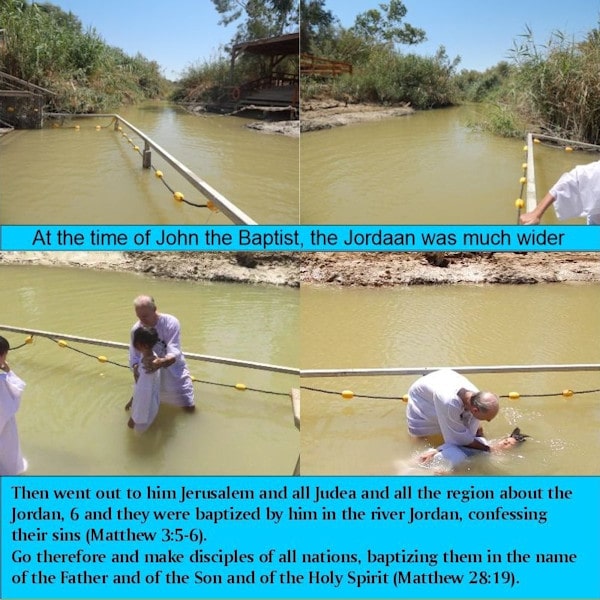
Baptism occurs after the confession of sin and repentance from worldly life (being a child of satan) into a life to the glory and honor of God, a life in which the fruits of the Holy Spirit (Galatians 5:22) are visible.
Baptism is a complete immersion in running water, at the time of John the Baptist it was the Jordan River. Baptism is made under confession of sins.
Baptism is for a person who is fully aware of his or her sins, repents, has accepted Jesus Christ as Savior and LORD.
Re-baptism is only possible if baptism has taken place at a young age, not consciously, but more at the instigation of pastor, parents or family.
Child baptism is actually a dedication from the parent or parents with the promise to God to teach the baby, the child and to teach the Christian Biblical values and norms and the teaching of Jesus Christ and His apostles.
Matthew 3:11

John's baptism placed the individual in the water. THE BAPTISM OF JESUS puts the Christian in the Spirit, totally connecting with the Lord.
FIRE PURIFIES OR DESTROYS. Therefore, salvation in Jesus Christ will be cleansing for the true ones who accept Him as Salvor, it is destructive for those who reject Him.
- Wait and welcome the work of purification of the Holy Spirit as a result of habitation and continuous involvement with Him.
- Develop a huge grudge towards all sexual immorality. Know that sexual sin begins with an inappropriate thought, look or touch.
- Call the worry sin. Discipline yourself to walk away from any anxiety and choose to trust the Lord.
- Recognize that faith is a decision and obedience rather than skill. Obedient faith releases the power of the Holy Spirit to accomplish the task.
It is the Holy Spirit who sets his servants in Flames of Fire!
Matthew 3:17

- Do you struggle trying to figure out if you are doing enough to please God? When Jesus was baptized, He had not yet publicly taught, performed any miracles, or initiated any kind of ministry. But God called him "My beloved son in whom I am well pleased." Likewise, God is pleased with you because you are His child. This pleases you far more than anything you can do. Ask God to show you more and more how much He likes you.
We should not be surprised when temptation comes. Satan deliberately sought to tempt Jesus, and he seeks to do the same to us. How do you react to temptation? Every time Jesus was tempted, He responded with the word of God (Matthew 4:1-11). Be diligent in studying God's Word so that you too will know what action to take to resist and overcome temptation when it comes.
Matthew 4:19

This verse suggests the theme: "The highest summons", which can be summarized as follows:
- The divine call - come after me - Jesus called you not only to accept Him and start attending services. He has work for you, pray to God that He will show you where you will fit in and develop your gifts and talents for the Lord's work.
- Divine concern - I will make you - It does not matter if you think you are not ready. If you look and think there are better, more experienced people. It is God who transforms you and prepares you, so just be willing, put yourself in the position, want this, do not be lazy. Do not be a dwarf in faith. But be constantly growing. The Lord said that the work is great and the workers are few.
- The divine mission - fishers of men - at first Jesus called fishermen, simple people, but He calls people from all layers of society, from all nations and peoples. To be fishers of men. You say: oh! But I do not know how to do it. First, have a correct life in society, your neighbors and family, because if you are an honest Christian they will respect you and often even look for you to ask for prayer, guidance or some kind of help. Be ready! Pray, have your time with God, study the Word because the Holy Spirit will remind you of what was studied. Start slowly, little by little and as you grow, God will increase your responsibilities. Jesus loves you and wants you to be His helper in this work.
In another translation it says, "Blessed are they who feel their spiritual need."
The first beatitude goes directly to the heart of man's need. Poverty of spirit is essentially the dethroning of pride. Pride is the very essence of sin. Pride is the sin of exaggerated individualism, the sin of dethroning God from His rightful sovereignty.
The Greek word makarios means “happy”. But it is obvious that “… the blessings contemplated in the Beatitudes cannot in any way be expressed in our language by the word or the concept of happiness”. Rather, they refer to the bliss that comes only to those who enjoy salvation in Jesus Christ.
Matthew 5:4

- Jesus said that those who cry are blessed will be comforted. The comfort of God, which is administered by His Holy Spirit, is so tremendous that it is worth having a problem just to have that experience. Like most things of God, it is beyond any kind of human comfort.
- Let God be his source of comfort. When you are suffering, just ask Him to comfort you. Then wait in His presence while He works on your heart and emotions. He will not fail you.
Matthew 5:4

- Sadness should make us seek the heart and hand of God so that we can find the comfort latent in affliction.
- Crying is something that comes right after the need to be “poor in spirit”. This crying leads to repentance and conversion.
- The promise to those who cry is that they will be comforted. A compassionate Christ is especially close to those who weep. Let God be your source of comfort. When you are suffering, simply ask Him to comfort you. Then wait in his presence while He works on your heart and emotions. He will not fail you.
Matthew 5:5

- The meaning of true meekness, unfortunately, has often been misunderstood. He has often been thought of in terms of modest, negative, and almost false humility. But actually, it is something very different, even when it comes to someone compared to their mate. Meekness is surrender to God, submission to His will, the readiness to accept whatever He can offer, and the readiness to assume the lowest position. It is an active fulfilling of God's will in our daily lives. Jesus Christ is the supreme example of such meekness.
- Of the meek it is said that they will inherit the earth. The world believes that the way to win, is to assert your rights. But Jesus said that those who accept His will will one day reign with Him.
Matthew 5:6

It so happens that the word “justice” corresponds to the term צְּדָקָה “tsedakah”, which is a type of justice that comes from the observation and fulfillment of the commandments of the Eternal One.
In this second sense, who are those who hunger and thirst for justice? Let us see another verse that is in the book of the Prophet Amos, and that can help us clarify: Behold, the days are coming,” says the Lord God, when I will send a famine on the land; not a famine of bread, nor a thirst for water, but of hearing the words of the Lord Amos 8:11.
The hunger and thirst that Jesus refers to is also in relation to hearing the words of the Lord. In Hebrew, the word to hear is the verb לִשְׁמוֹעַ "lishmôa", which means "to hear", and "to obey". There is even a great commandment in the Bible, which uses this verb, endorsed by the Master himself:
And one of the scribes came up and heard them disputing with one another, and seeing that he answered them well, asked him, “Which commandment is the first of all?” Mark 12:28
And Jesus answered him, The first of all the commandments is: The first is, Hear, O Israel: The Lord our God, the Lord is one Mark 12:30 Therefore, God will awaken a people who will hunger and thirst for justice, that is, who will be thirsty/hungry to hear/fulfill the will of the Eternal.
The righteousness that they will hunger for, is the righteousness of walking according to the commandments and the ordinances of Jesus: you who know righteousness, the people in whose heart is my law… Isaiah 51:7.
And they will be satisfied, for they will learn, and they will hear, and they will walk in the light, for the knowledge of the Eternal will cover the earth, as the waters cover the sea.
On that day, all injustice will cease.
For the earth will be filled with the knowledge of the glory of the Lord, as the waters cover the sea Habakkuk 2:14.
Matthew 5:7

Those who have received God's mercy must show mercy to their fellows. The most vivid illustration of how irrational it is to refuse to forgive others is presented in the parable of the Good Samaritan (Luke 10:30-37) gives an excellent example of mercy to someone in need. Mercy has been defined as GOODNESS IN ACTION.
Matthew 5:8

THE CLEAN OF HEART - Here is a character trait that only the Spirit of God can produce. This is sanctification. A pure heart that has nothing in itself that is contrary to God's love.
Jesus declared that only the pure in heart will see God. And this refers to the life here as well as the future life. Sin is like dust in the eyes. It obscures vision and distorts vision. We can only enter into full communion with the Lord when our hearts are clean from all sin (1 John 1:7).
Purity of heart is the end and the sum of the previous beatitudes. The possibility of such inner righteousness is clearly implied; but it is also apparent both in Scripture and in universal experience that no one is pure by nature (Jer 17:9). Hearts can only be pure if they are purified.
The heart must be cleansed from its pride (Pv 16:5); if not, instead of being "poor in spirit" he will be arrogant and self-sufficient; instead of being sorry (someone who truly cries) he will be self-indulgent; instead of being "meek", a man will be headstrong and impetuous. The heart must also be cleansed from double-mindedness (James 4:8), from selfishness and contention (James 3:14), and from unbelief (Heb 3:12).
Matthew 5:9

- James says in his epistle that "the wisdom that cometh from above is first pure, then peaceable" (James 3:17). This is the order here. Only the pure in heart, who have been cleansed from the carnal nature (the cause of all inward strife), can have the "peace of God" fully in their souls. A divided heart is a troubled heart. Only the peace of Christ controlling us can make us peacemakers.
- Nobody likes a bully. But the challenge for the Christian is: am I a peacemaker - in the community, in the church, in the home? This last location is the hardest test of all.
- Sons of God is, in Greek, literally "sons of God". When the definite article is omitted in Greek, it emphasizes type or character. When people make peace, they are called "sons of God" because they act like God. In Eastern thought "son of" means "to have the nature of".
Matthew 5:10

It should be noted that those who suffer persecution for the sake of justice are blessed. Some who have made themselves martyrs claim to be persecuted for righteousness' sake, when in fact they are suffering because of their own ignorance. When criticized for acting or speaking unreasonably, they cite this bliss. But this is falsifying the word of God (2 Cor 4:2).
When persecuted for Jesus' sake, the Christian must exult and rejoice. Jesus cites the example of prophets in Old Testament times. But in fact, He himself is the supreme example of what is described in verse 11. Someone has said that the Beatitudes are an autobiography of Christ.
Matthew 5:13-16

- THE DEEP HAPPINESS of those who enjoy the presence of God, describes the CHARACTER OF CITIZEN OF THE KINGDOM, and the metaphors of SAL and LIGHT demonstrate the BENEFICIAL INFLUENCE of citizens as they penetrate secular society.
- Jesus calls people to holiness that comes from the heart. HOLINESS IS THE RESULT OF PERSONAL LOYALTY TO GOD.
- ACKNOWLEDGE that your life has a positive or negative effect. Live responsibly to bring the glory of God.
- BE LOYAL TO GOD. Drop any ambition that gets in the way of your commitment to God.
- ACKNOWLEDGE that only God has power over death and hell. Have reverence for Him. HONOR TO THE LORD AS MAXIMUM AUTHORITY (Matthew 10:28).
Matthew 5:13

Salt has two uses - to taste and to preserve.
- Foods like oatmeal are very unpleasant to taste without salt. In the same way, life without Christ and without Christianity is unbearable insipid. Just as Christ revitalized and enjoyed the believer's life, each disciple, in turn, must do the same for the lives of others.
- The salt is be preserved. Before the advent of ice chests and modern refrigerators, salt was one of the main ways of preserving food. Thus, the follower of Christ must act as a preservative in the world. One cannot help but imagine what would happen to modern society, with all its moral rottenness, if it were not for the presence of the Christian church.
Mateus 5:14

- Day 3 we spoke about whether one would be accepted or left behind. Matthew 25 is an elaboration of the conditions for being accepted. Yesterday the being filled with the Holy Spirit. Today the use of the talents which a believer has. One is able to bear a large responsibility (5 talents), the average believer with 2 talents, and some consider themselves small (although not so, but consider only performing motherhood low and nothing else) a 1 talent.
- Let us look at the value of a talent in the time of Jesus. 1 talent represented a daily wage of 16 years. 2 Talents a daily wage of almost 33 years. And 5 talents the wage of 82 years of hard work.
- The 5 talents can be compared to a believer who came to faith at a young age and who put DAILY his life fully under the control of the Holy Spirit until the end of his or her life. And is fully committed to the work of the Lord.
- The 2 talents, a believer who came to faith at a later age and remained DAILY full of the Holy Spirit until the end of his or her life. Who had a job and spent his money to the work of the Lord and possibly partly devoted his or her time to the work of the Lord.
Matthew 5:20

It is right for a Christian to thank God that he is not under law but under grace. But if he thinks the demands on him are less because of this, he has not read the sermon on the mount in order to understand it. Jesus emphatically declared that He demands a higher righteousness than that of the scribes and Pharisees. In the rest of the chapter, the Lord provides six concrete examples of exactly what He means by this. It basically refers to an inward attitude justice rather than merely an outward action. But this raises the demand. You must not only guard your actions, but also your attitudes; not only your words, but also your thoughts. The law of Christ makes more demands on those who keep it than the law of Moses.
Matthew 5:23-24

YOU SHALL NOT KILL is the sixth commandment of the 10 commandments (Ex 20:13; Deut 5:17) Jesus did not nullify it. Rather, He gave it a higher interpretation: If you are angry with your brother, you have got murder in your heart.
The application of the above warning is made in two spheres - worship (23,24) and legal process (25:26). The meaning of this is clear. When someone is reconciled with God, he has to meet the divine conditions, because the error is all on one side. But when someone reconciles with his brother, both have to compromise, because in every human argument there are two sides. What Jesus meant however, is that the worship of a person in the house of God is not accepted as long as there is any bad feeling between what would be a worshiper and a "brother". The relationship with God cannot be right as long as the relationship with a brother is wrong.
In verse 25 it says: When you and your opponent are on their way to court, settle your differences right away. Otherwise, the accuser may turn you over to the judge, and the judge to an official, and you are thrown into prison. verse 26: I tell you the truth: you will not be released until you have paid every last penny. This application is a little different. Your opponent is dragging you to the judge. Jesus said it would be wiser to settle the matter outside the court. Otherwise, the person will not leave prison until he has paid the last penny. The point is that Christians should resolve their differences as quickly and quietly as possible, and resolve them among themselves. Christians usually do not need a judge or a court to decide what is right among themselves (1 Cor 6:1-8).
Matthew 5:27-28

- Jesus quoted the seventh commandment (Ex 20:14; Deut 5:18), and then proceeded to give it a higher interpretation. He indicated that in God's eyes wrong intention is as sinful as wrong action. And God is equally aware of both.
- Verses 29 and 30 show how serious lust is. Jesus said: Therefore, if your right eye should seduce you, pluck it out and take it away from you (29). The Greek word to seduce is skandalizo. It comes from the noun skandalon, which was first the lure of a trap or snare, and then used as a snare or snare itself. So the meaning here is: If looking is a trap or snare for you, avoid looking in all ways. The verb is translated as “stumbling” or “causing to sin”.
- Christ declared that it would be better for someone to lose his right eye or his right hand than to be cast into hell. We cannot believe that He was advocating the physical mutilation of the body—though in the past some have mistakenly taken His words literally. He was speaking metaphorically: If a close friend or favorite association of any kind is becoming a seduction for you, cut it off! It is better to be bereft of anything in this life than to be lost forever.
Matthew 5:38-39

The basic principle of justice reflected in the law of Moses was: An eye for an eye and a tooth for a tooth. See Ex. 21:24; Luke 24:20; Deut. 19:21. The purpose of this commandment was not to encourage men to return aggression, but to prohibit them from carrying out a penalty greater than the crime.
Jesus introduced a higher law, that of NON-REPRISAL. His command was: "Do not return the aggression!" He explained this principle in five specific ways: turn the other cheek, let your cloak take you, follow the person a second mile, give it to anyone who asks you, and do not deviate from anyone you want to lend it to you.
Many people have assumed that these words of Jesus are to be taken literally. But thinking about it a little will show how wrong this position is. For example, if a man asks for some money to eat - suppose you give him what he asks for, and he uses the money to get drunk, have you done a good deed? Did you act out of intelligent love? Or has what you intended to be a blessing turned into a curse? What Jesus was commanding was a generous and compassionate spirit towards the needy.
What must always be remembered is that “the letter kills, and the Spirit quickens” (2Cor 3:6). Jesus' new law is primarily a new spirit. Master was mainly interested in attitudes. It must be recognized that "the Sermon on the Mount is, in its entirety, about principles and not rules."
Matthew 5:43-44

Jesus opposed this false teaching through the incisive command: LOVE YOUR ENEMIES. It is natural to love friends; to love enemies is supernatural. But those who do so demonstrate that they are children of the Father who is in Heaven. For He gives the sun and rain to both the bad and the good. If you show kindness only to friends, you will be no better than tax collectors. These were the tax collectors for the Roman government, and were despised by most of their fellow Jews as being at the lowest end of the scale of iniquity.
Then comes the climax of this chapter: BE YOU PERFECT, AS YOUR FATHER WHO IS IN HEAVEN IS PERFECT. This sounds like hopeless advice. But the correct interpretation is that in the human sphere we must be perfect, just as God is perfect in the divine sphere. This is the aim and aim of the Christian life.
John Wesley, who was a careful student of the Greek text and surprisingly aware of the importance of textual criticism, translated the first part of this verse as follows: "Take heed not to practice your righteousness before men, to be seen of them." Most recent translations give: "Be careful not to do your works publicly to be noticed by the people."/p>
Jesus did not say we should not let someone else see our good works. He had already admonished His disciples, "Let your light so shine before men, that they may see your good works and give glory to your Father who is in heaven" (Matthew 5:16). It is that He is dealing with here. The meaningful phrase is: TO BE SEEN BY THEM. We are to seek God's glory, not our own.
Mateus 6:5
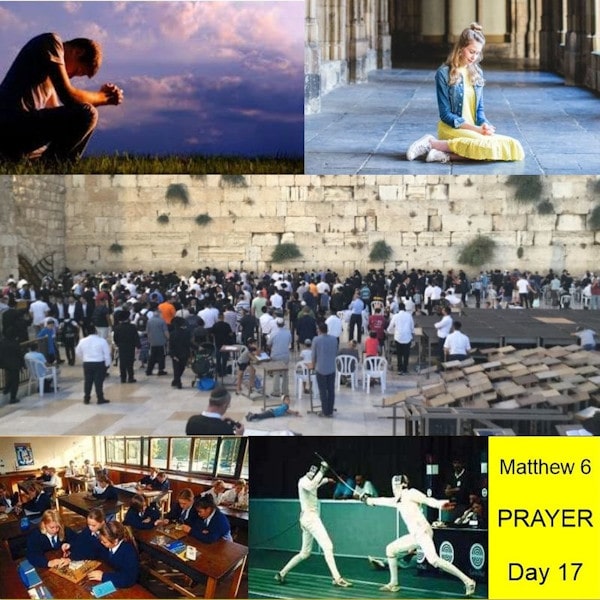
Prayer is our communication with God
- In Matthew 6, Jesus teaches us the high priestly prayer: The Our Father.
- Thanks for the grace of God the Father and for His will to be done, for our daily bread and for the forgiveness of our daily sins. And asking for protection from evil.
- Our prayer should start with confessing sins, it is best to ask for forgiveness of sins when someone is aware of their sins.
- Our prayer is a daily thanksgiving for all the good we receive from God, the finished work of Jesus, food and drink, work, health, fulfillment with the Holy Spirit.
Our prayer is to hear what God has to tell and ask us to reveal His will. - Our prayer is an intercession for governments, education, church leaders, missionaries, evangelists.
- Our prayer continues by names for unbelievers and that God will send laborers into the harvest.
- Our prayer is penetrating based on Biblical texts and perseverance, like fences and struggles.
Matthew 6:9-13
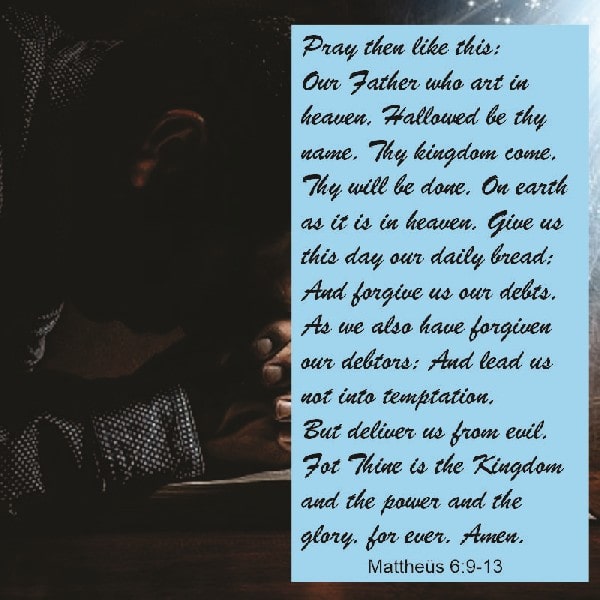
Christ warned against using vain repetitions in prayer. The Lord's Prayer is a perfect model of the simplicity and sincerity of Jesus' petition. She is also a beautiful example of poetic parallelism. There are only ten lines but very significant!
OUR FATHER - the One to Whom we address, suggests an intimate communion, WHO IS IN HEAVEN - requiring reverence.
THY NAME BE SANCTIFIED - This is a challenging petition: Let Your holy name be sanctified through my life today, as I, being the bearer of Christ's name, live a life like His.
YOUR KINGDOM COME - This must take precedence over personal interests. This petition is also linked to world evangelization. For it is particularly in the salvation of souls that the kingdom of God comes.
LET YOUR WILL BE DONE ON EARTH AS IN HEAVEN - This petition was echoed by Jesus in the garden of Gethsemane (Luke 22:42). There is no greater prayer you can offer. Thy will be done first in my heart as it is done in heaven.
GIVE US THIS DAY OUR DAILY BREAD - Physical support must not come in 1 place; but it has his place in due time. God is interested in our personal needs, and He wants us to put them before Him in prayer. The expression “every day” means "what is necessary for existence today".
FORGIVE US OUR DEBT, AS WE FORGIVE OUR DEBTORS. - One who carries a spirit that does not forgive others must stop before offering this prayer. Every human being is in debt, for "all have sinned" (Rom. 3:23).
AND LEAD US NOT INTO TEMPTATION, BUT DELIVER US FROM EVIL - Temptation can be "trial"; it can also be said in the following way: "And do not put us in a probation, a severe probation, a probation that comes to put severe pressure on our moral state”.
FOR YOURS IS THE KINGDOM, THE POWER, AND THE GLORY, FOREVER. AMEN! - In ancient Greek manuscripts, the Lord's Prayer ends with the last petition. That ending was added a long time ago, probably to give you a more finished conclusion.
Matthew 6:16

Again hypocrites are depicted, this time as being grieved, disfiguring the face, so that men appear to be fasting. And again we are told that "they have already received their reward".
In verse 17 Jesus' instructions for fasting is to look like you are NOT fasting. It is combing your hair, washing your face. Fast for the spiritual good of others and himself before God. Notice that Jesus says that God has a reward for this type of fasting.
Matthew 6:19-21

Jesus warned of the folly of laying up treasures on earth. Everything can be destroyed or lost. Expensive clothes were of great importance in the treasures of oriental men and women. The moth would be a great threat to such wealth; rust also literally means eating. So this could refer to worms eating clothing. At that time it was also common for thieves to dig the mud walls of Palestinian houses to steal. But in Heaven all our treasures are safe.
Here Jesus appears to be a very significant principle: where your treasure is, there your heart will also be. By encouraging a person to contribute to the Lord's work, you are helping to link them to God/Heaven. Even asking an unbeliever to contribute to a special church project can propel him to salvation. Therefore, we render people a clear service when we give them a chance to present their offerings to the Lord. Our heart goes where our money goes.
Mateus 6:22

OBEDIENCE IS THE RESPONSE OF FAITH
Obeying His Father was extremely important to Jesus. OBEDIENCE IS THE RESPONSE OF FAITH TO ANY GOD'S INSTRUCTION
Jesus taught that true faith will always be manifested in obedience to God's revealed will. SUBMIT YOUR PLANS AND FUTURE TO THE WILL OF GOD.
Be filled with the light of life so that there is no darkness in you. Have good eyes. Having the eyes of your hearts enlightened, that you may know what is the hope to which he has called you, what are the riches of his glorious inheritance in the saints (Ephesians 1:18).
Develop a personal commitment to the Lord and his will.
Determine to use and obey the word. Prefer God's will over your own.
As for what was sown on good soil, THIS IS HE WHO HEARS THE WORD AND UNDERSTANDS IT; he indeed bears fruit, and yields, in one case a hundredfold, in another sixty, and in another thirty (Matthew 13:23).
God bless the seeds planted in your heart because there will be a great harvest! But remember that seed must die first for it to bear fruit.
Matthew 6:22-23

"If anyone wants to come after me," - That is, if anyone among the believers want to follow the Lord. This one is a saved disciple who especially desires to follow the Lord. "Follow me" gives the solution to the conditions that are established shortly thereafter.
"Deny yourself"- Denying yourself means disrespecting yourself or giving up your privileges. To renounce oneself denotes putting your self aside to seek the mind of God, so that in all things he does not follow his own mind nor his own centrality. Only this kind of person can follow the Lord. This is certainly evident for how can anyone follow the Lord and follow himself?
"Take up your cross, and follow me"- This is much deeper than denying yourself. Denying yourself is just disrespecting yourself while taking up the cross is obeying God. Taking up the cross means accepting whatever God has decided for the person and willing to suffer according to God's will. By denying ourselves and taking up the cross, we can truly follow the Lord.
"For whoever wants to save his life will lose it; but whoever loses his life for my sake will find it" - The word life here is "psuque" in the original Greek, meaning "soul"; and for this reason this verse tells us about the salvation or loss of our soul. "Whoever loses his life for my sake" - This is denying himself and taking up the cross said in the previous verse. Losing your soul is the same as denying yourself. The Lord explains that if, out of love for Him, anyone wishes to forsake all the pleasures of the soul and suffer according to God's will, he will find his soul. This simply means that one who desires for the Lord's sake to deny his own thoughts and desires and not be satisfied with the things of the world but instead go through many sufferings, he will receive from the Lord at another time with blessing and joy what his heart desires.
By studying this verse, we should be able to understand what is the meaning of soul salvation. Saving the soul denotes gaining for oneself happiness and joy for the complete satisfaction of the heart. Losing your soul, on the other hand, speaks of losing your own joy, desire and satisfaction.
Matthew 6:24
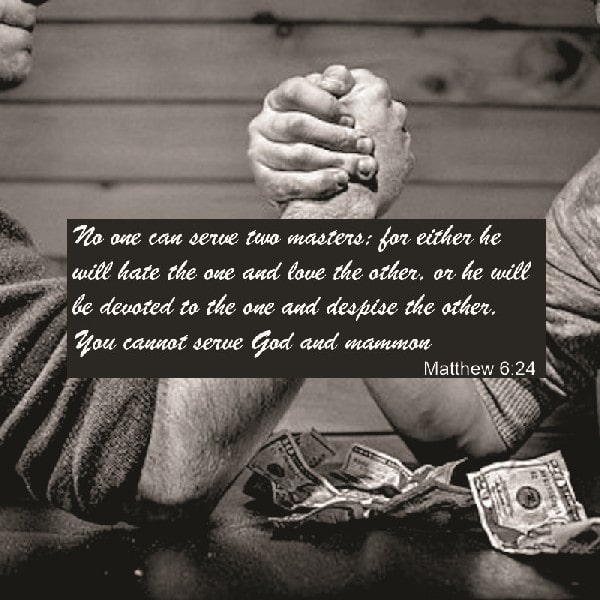
ONE MASTER - God claims total loyalty; the disciple cannot divide his loyalty between God and his possessions. Mammon is the Aramaic word for money or wealth.
Do you have a savings or investment portfolio? Even if you do not, you should be well aware of your financial situation. It is wise to plan and be financially responsible. Being greedy, however, is another story. Do not let the pursuit of money or material possessions keep you from seeking the treasures of the Kingdom of God, which have far more value, eternal value, than anything on this earth.
Matthew 6:25-34
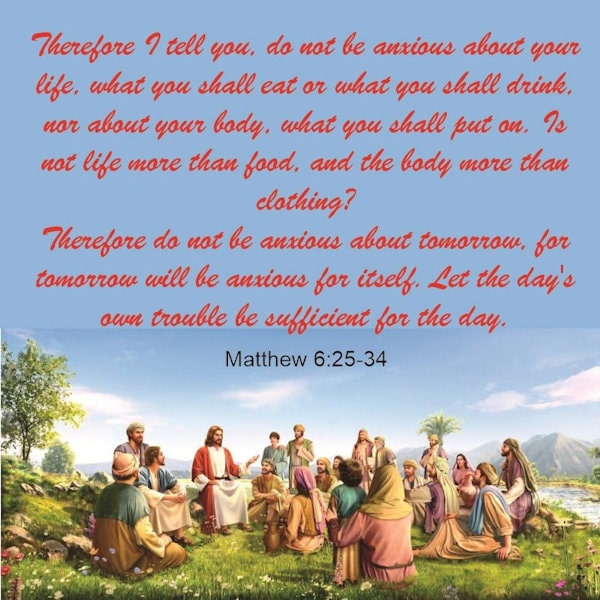
The sin Jesus condemns in this section is that of worry. DO NOT WORRY ABOUT DAILY LIFE those translate as: "BE NOT ANXIOUS". Life is more than food (eating). Here it is about both spiritual existence and material life.
Then follows the great passage on stewardship: Seek first the Kingdom of God and His righteousness, and all things shall be added unto you. We must first seek the Kingdom of God and righteousness for ourselves. And second, to seek the Kingdom of God and righteousness for others. That is, our main concern as disciples of the Lord must be the salvation of souls and the building of His church. If we put this first, He promises to supply all material needs.
The chapter ends with a closing admonition not to worry about the future. Your evil is enough every day; that is, problems and cares that already belong to you.
Mateus 6:33

But seek first his Kingdom and his righteousness, and all these things shall be yours as well (Matthew6:33).
- All that God is, and all that God has, is available through prayer (R.A. Torrey).
- When we know and trust in the Father's love for us, and know that He is aware of our needs, we will focus on seeking Him.
- Seek to know him, seek to be filled with His presence and His justice.
- God does nothing except in answer to your prayer (John Wesley).
- Ask, and it will be given you; seek, and you will find; knock, and it will be opened to you (Matthew 7: 7).
- Knowing that God has committed Himself to His word to answer prayer is the basis and foundation of our prayers.
- When we come to the Father, we must believe that we will receive or else it is better NOT to ask, And without faith it is impossible to please God. For whoever would draw near to God must believe that he exists and that he rewards those who seek him (Hebrews 11:6).
Matthew 6:34

A WORD FOR 2025 - DO NOT WORRY ABOUT TOMORROW, GOD IS ALWAYS THERE.
Although they can cause a lot of trouble, worries and anxieties about tomorrow are useless. Preoccupying yourself in advance is very different from trusting and planning with balance and wisdom. Jesus teaches us to believe and rest our hearts in Him, not in circumstances. Trust your future in the hands of the One who is the Lord of time, only then will you feel peace and security.
Therefore do not be anxious about tomorrow, for tomorrow will be anxious for itself. Let the day's own trouble be sufficient for the day (Matthew 6:34).
Instead of worrying, allowing your emotions to control your entire being, spend your time praying and expressing your trust in God. Give Him all your anxieties. Read and memorize Bible verses about the power of God.
Always remember that God takes care of you in any situation. There is no problem, illness or circumstance greater than our God. Trust in the power of God, He will surprise you by doing much more than you can imagine.
Now to him who by the power at work within us is able to do far more abundantly than all that we ask or think, to him be glory in the church and in Christ Jesus to all generations, for ever and ever! Amen! Ephesians 3:20-21.
A blessed 2025 to all!
- CRITICAL CENSORSHIP IS A BOOMERANG - A critical spirit is a denial of true religion. This was one of the worst faults of the Pharisees (along with hypocrisy). Thus, Jesus warned his followers: DO NOT JUDGE, THAT YOU MAY NOT BE JUDGED. Using the term in the popular sense, we would paraphrase it like this: “Do not be critical, or you will be criticized”. The problem with judging others is that we place ourselves above those we judge.
- Today people use the phrase a lot: DO NOT JUDGE! When they get caught doing something wrong... It just means, “Do not criticize me! What I do is none of your business!" And Jesus did not say we could never judge, for in John 7:24 He says, "Do not judge by appearance alone, but make fair judgments." There is a difference between criticizing for criticizing. Here in Matthew 7:1 Jesus just gave a hint: "YOU GET WHAT YOU GIVE". Give a smile and you will receive a smile; mumble and you shall get a mumble. Be ready.
Matthew 7:7-8

Man's action provokes God's reaction and that faith is not just a feeling of motivation or simple emotion, but it must move the power of God when accompanied by actions.
It is the habit of man to cry and regret his own problems and needs even though he knows that this will result in nothing.
God knows our needs but demands that we call on him. "Cry out to me" CLAIM, call for someone; shout; shout out; address someone.
God's positive promise is that if we cry out to Him, He will answer us in such a way that we will be impressed! (Ps 4:3, 18:6; Mt 7:7)
Matthew 7:7-8

TASK, KNOCK, SEARCH - The first suggests sincere prayer, the second fervent prayer, and the third a desperate prayer. It is perhaps suggested - and experience seems to support this thinking - that it is sometimes necessary simply to ask in order to get the answer. If she does not come, persevering prayer must be begun; one must knock. If the answer is still lingering, it may be necessary to search, a desperate, even agonizing prayer. But the answer is that all these kinds of prayers will be rewarded.
In verse 9 Jesus used the analogy of a human father. Not one of his hearers would give his children a stone for bread, or a serpent for a fish. The conclusion, then, is that if we, being bad - "as you and I are compared to the Father" - give good things to our children, how much more will Heavenly Father give good things - and Luke brings the expression "the Spirit Holy" (Luke 11:13) - to those who ask him.
Matthew 7:12
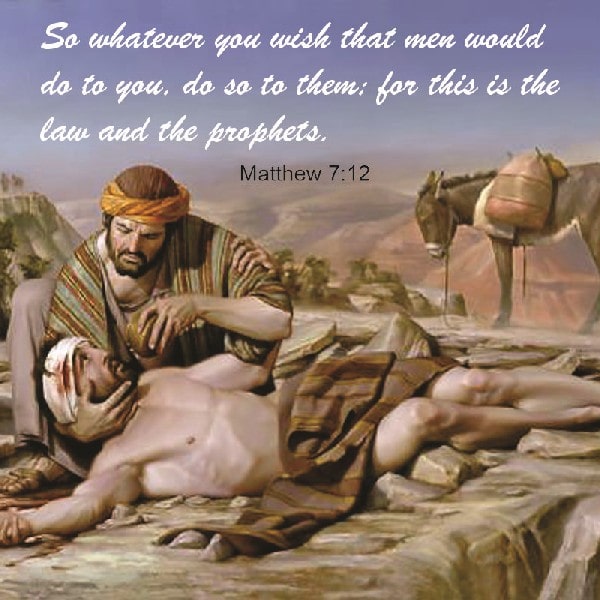
The so-called golden rule summarizes the law and the prophets; that is, the Old Testament. Christianity is nothing less, but it is something more.
The golden rule had been stated in negative form before the coming of Christ, Confucius said: "Don't do to others what you would not want them to do to you". The Jewish teachers had a similar saying. But it is generally recognized that Jesus was the first to present it in a positive light. This is something very different. Not hurting is one thing; reaching out to help is another. This positive attitude is illustrated by the parable of the Good Samaritan (Luke 10:30-35).
Mateus 7:21

US troops fighting against guerrilla actions in the Philippine islands during World War II are said to have used a language test to distinguish Japanese soldiers captured from other Orientals when ordering them to utter a word containing the letter "l", a sound that does not exist in the Japanese language.
Every life is tested in your speech - Not so much from the lips, but from the heart. Jesus said: "Not everyone who says to me, Lord, Lord! He will enter the kingdom of heaven".
Why not?
Because the speech is wrong; their lives were not in harmony with their words and their speech was hollow is false.
When Jesus touched the leper, He became ceremonially unclean, according to the Law. But in fact, His power cleansed the disease. So we, instead of being contaminated by contact with sinners, should, by the power of the Holy Spirit, have a redemptive influence over them. As leprosy, in its way of spreading through the body and ravaging it, is an awesome type of sin in the soul, it is quite fitting that its cure should be referred to as a "cleansing."
Matthew 8:13

Matthew 8: 5-13 tells this story. It took place in Capernaum, the city Jesus had adopted as his headquarters. A centurion - who was the officer in charge of a hundred Roman soldiers - came to Christ with an urgent request. One of his servants, "whom… he esteemed very much" lay at home paralyzed and violently tormented.
Jesus immediately replied: I WILL COME AND HEAL HIM. But the centurion objected, saying that it was unworthy for the master to come to his house. All Jesus needed to do was say just one word and his servant would be healed. He argued that just as he gave orders and were obeyed, so the Master's orders would have complete authority for their execution. When Jesus heard this unusual declaration of faith in his divine power, he marveled and at his low-faith followers: Verily I say unto you that not even in Israel have I found so much faith.
The Master told the centurion to go home in faith. And just then his servant was healed.
Are we gladdening Jesus' heart with firm faith in Him?
Matthew 8:19-20

THE COST OF DISCIPLESHIP - An anxious scribe - a teacher of the Law - approached Jesus with an offering that sounded like a complete consecration: Master, wherever you go, I will follow you. But Christ put this possible disciple to the test, reminding him that foxes have holes, and birds of the air have nests, but the Son of Man has nowhere to lay his head. In other words, He said, "Think about the cost of that decision."
Another disciple of Jesus said to him: Lord, let me first go and bury my father. The master's answer seems harsh: Follow me, and leave the dead to bury their own dead. As the eldest son (implied here), it was his responsibility to see that when his father died he had a proper burial. Jesus informed him that there were more important things to do. Those who were spiritually dead could bury those who became physically dead.
Jesus calls men to follow Him, not as a teacher or as a pattern of a charitable life, but as the Christ, the Son of God… When we are called to follow Christ, we are called to an exclusive connection with his people.
Under the guidance of the Holy Spirit
- How do you know that you live under the control of the Holy Spirit? When every day of the year, the fruits of the Holy Spirit mentioned in Galatians 5:22 are visible in your life 24 hours a day.
- One achieves this by living a sinless life and immediately confessing every sin.
- It is your WILL to live sinlessly and submit yourself to God and to (want to) do His Will.
- It is like Matthew, the publican who led a rich and prosperous life, immediately abandoned everything, his money on the publicaner's table, and immediately followed Jesus. As John the Baptist proclaimed: CONVERY and REPENTANCE. Immediately say goodbye to worldly life and immediately become a follower of Jesus. Immediately reject everything that is worldly, no longer listen to worldly things, watch worldly on television and films. Do not listen to people who proclaim world things.
- Disse-lhe Jesus (Mat.19): 21 Se queres ser perfeito, vai, vende tudo o que tens e dá-o aos pobres, e terás um tesouro no céu; e vem, segue- me. 22 Mas o jovem, ouvindo essa palavra, retirou-se triste; porque possuía muitos bens. 23 Disse então Jesus aos seus discípulos: Em verdade vos digo que um rico dificilmente entrará no reino dos céus. 24 E outra vez vos digo que é mais fácil um camelo passar pelo fundo duma agulha, do que entrar um rico no reino de Deus.
Matthew 9:9

- Sitting at the tax office - The Romans required the Jews to pay taxes for every fruit tree, every well, every piece of land and animal they owned. This taxation seemed oppressive and the fact that it was imposed by foreigners was particularly offensive. The publicans were the local tax collectors - Jews who were hated by their countrymen.
- Just to this tax collector Jesus said: FOLLOW ME. Matthew immediately, rising, followed. This was a big step for Matthew. THE DISCIPLE IS DRAGGED FROM HIS RELATIVE SECURITY TO A LIFE OF COMPLETE INSECURITY (ie, in fact, to the complete security of the COMPANY OF JESUS).
Matthew 9:12

When Jesus was sitting at the table in Matthew's house - many tax collectors and sinners sat together with Jesus and his disciples. A good translation for publicans is “tax collectors”. Local tax collectors were hated by their countrymen. They were considered “double-faced” and “despicable” because “they had sold their services to the foreign oppressor against their own people, and were literally involved in a robbery.
SINNERS, on the other hand, were those who were considered as such by the Pharisees, because they were not careful in observing the many ceremonial requirements of the written and oral law. A serious Jew would not eat with tax collectors or sinners.
So the Pharisees complained to the disciples. Apparently, they feared attacking Jesus directly. But the master had an answer for them: THE HEALTHY DO NOT NEED A DOCTOR, BUT THE SICK DOES. This expresses a perfectly obvious fact and explains why the Pharisees despised Jesus. They thought they were sane. The Master then quotes Hosea 6:6 - FOR I DESIRE STEADFAST LOVE AND NOT SACRIFICE. One of the dominant ideas of the Minor Prophets is the demand for justice rather than ritualism. This is what this Old Testament statement means. It remains valid today. No amount of animal sacrifices - no ritualism or outward righteousness - makes up for the lack of love and mercy in a person's life. Jesus did not come to summon those who considered themselves righteous, but those in need - those who were despised sinners.
Matthew 9:18

- Jesus was approached by a synagogue leader, Jairus. - The name is given in Mark 5:22. One of the interesting things that happens here is that Matthew reports that Jairus said: MY DAUGHTER HAS EVEN DIE while Mark presents: MY DAUGHTER IS DYING (Mark 5:23) - literally "in her last breath." Mark and Luke tell of someone who tells, as they were on their way home, that their daughter had died. But was she dead when Jesus started walking with Jairus? To explain, we use Matthew's custom of summarizing the narrative. Mark and Luke provide the details that fill Matthew's meager account.
- As Jesus accompanied Jairus to his house, a shy woman who had been hemorrhaging for 12 years came up behind him and touched the hem of his garment. Notice well that, IT WAS NOT THE TOUCHING OF JESUS' ROBE THAT HEALED THE WOMAN; but IT WAS HER FAITH (verse 22). But her faith was manifested through her act. Jesus always gives us the chance to be part of the miracle.
Matthew 9:29
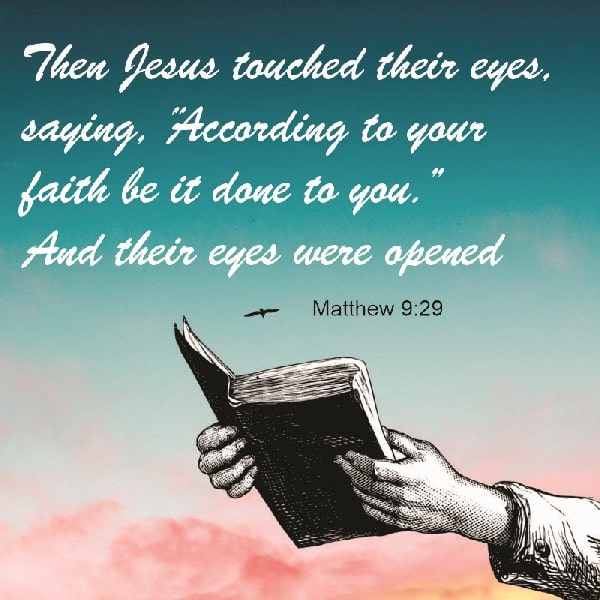
In this episode we find two blind men. They cried out: Have mercy on us, Son of David. With this sentence, we see the indication that "They accept him as the expected messianic leader that He would perform the wonderful works of mercy mentioned in Isaiah 35:5".
When they affirmed their faith in Him, Jesus replied: ACCORDING TO YOUR FAITH BE IT DONE TO YOU. This is a tremendously challenging statement for all Christians today. We will have what we believe the Lord can do for us.
Matthew 9:37-38
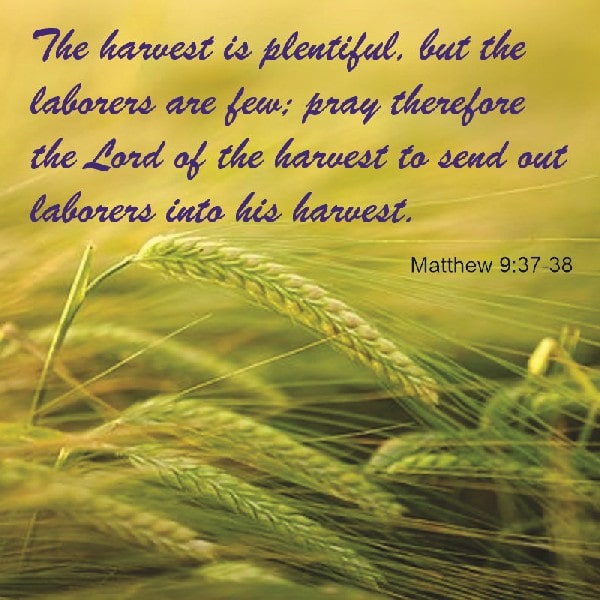
The Master's compassionate eyes saw the crowd as a great field, ready for harvest. He said to His disciples, Pray therefore to the Lord of the harvest, that He will send forth reapers into his harvest. This prayer is still relevant today. For although the reapers are in greater number, they are not enough in the face of the colossal growth of the harvest. Twenty centuries later, there are countless multitudes of people who have never heard the good news of the Gospel that Christ died to save them from sin. MANDAR is a strong verb in Greek. Jesus had an urgent need for the task of evangelization to be carried out.
In this example, and in these words of Jesus, we can see:
- Our Lord teaching us how to look at men.
- How this vision should touch us.
- How Christ would have us act.
Jesus warned His disciples of the persecutions that would overtake them. This prediction speaks not only of the immediate journey they were taking, but also of the many years of ministry to come. They should be PRUDENT AS A SERPENT AND SIMPLE AS DOVES. The first adjective means "cautious", the second "harmless" or "sincere". A successful Christian needs these two characteristics.
When delivered, they should not be anxious for their defense, for the Holy Spirit would give them the words they should speak.
Christ also declared that the coming of His Kingdom would result in the division of families, so that children could cause the death of their parents. This has happened many times in the past and it still happens today, especially in Muslim countries. With the warning that they would be hated by all men, because of Jesus, comes the promise: BUT HE WHO PERSEVERES TO THE END SHALL BE SAVED. There is a meaning that one is saved when he is converted, another that one is being saved day after day as he believes and obeys, and yet another that one will be saved in heaven, finally and forever. It is the second and third meanings that Jesus speaks of in this verse.
Matthew 10:24-25

The apostles could not hope to escape persecution, FOR HE THE DISCIPLE IS NO MORE THAN HIS MASTER - literally "teacher".
Despite these predictions of persecution, Jesus told His disciples not to be afraid. BECAUSE THERE IS NOTHING COVERED THAT DOES NOT HAVE TO BE REVEALED. The day will come when both the persecutors and the persecuted will be seen in their true light.
To make things more personal, Jesus said: EVEN THE HAIRS ON YOUR HEAD ARE ALL COUNTED (verse 30). Besides, YOU ARE BETTER THAN MANY LITTLE BIRDIES (verse 31). So the logical feeling is TRUST and not fear.
Matthew 10:34

Jesus' statement: I did not come to bring peace, but the sword is amazing - we could literally say "shocking". It is obvious that He is speaking of the inevitable results of the demands of discipleship. It will always be true that some members of a family will accept Christ, while others will reject Him. This brings an inevitable conflict. For God demands, first of all, our love and our fidelity. Speaking in earthly terms, this combats the nature of selfishness. He who wants to follow Christ must take up his cross in complete submission to the will of God.
One of the most significant sentences of Jesus is in verse 39. About the first part, “SEARCHING YOURSELF IS DEFEATING YOURSELF”. About the second, “SELF-DENIAL and SELF-SACRIFICE are the only paths to SELF-KNOWLEDGE”. In the context of the persecution described in the preceding verses, the special application of this truth would be: "He who, under the pressure of persecution, desires to preserve his life will lose his true soul-life; whereas he who dies with joy shall live".
WHEN THINGS DO NoT HAPPEN AS WE IMAGINED - Only Matthew and Luke (7:18-35) report the episode in which John the Baptist sent two of his disciples to Jesus. The prophet was wasting away in prison, evidently tempted to become discouraged and disappointed. He had introduced Jesus to the Jewish nation as their Messiah. He had humbly declared, “It is necessary that He should increase and that I should decrease” (John 3:30). John had imagined that Jesus would assume the role of Messiah, destroying the foreign oppressor (Roman) and freeing His people from slavery. But Jesus was not doing any of that.
The question that John asked, through his disciples, was literally: “Are you the one to come, or are we waiting for another? In other words: "Are you really the Messiah?" And sometimes that happens to us too! We were happy when we received some blessings but as the days went by, things did not go the way we had in mind. We start to get frustrated and upset because WE DO NoT UNDERSTAND THE WAY GOD IS WORKING! We often say: "was it really God's will?"
A slight allusion to John's problem is suggested in verse 6 - AND BLESSED IS HE WHO WILL NOT BE SCANDALIZED IN ME. What John did not understand was that Christ's first coming was in grace and mercy. The Judgment would have to wait for His second coming.
There are situations where we are so attached to the picture that we imagine that we forget to look around and see what is actually happening. Instead of Jesus giving a categorical answer, he told the disciples to go back to John and tell him what they had seen and heard. Healing the blind and the lame was a fulfillment of the messianic role, as described in Isaiah 35:5-6. But the climax was the preaching of the gospel to the poor (Isaiah 61:1). This was his main credential.
So, we need to receive what God wants to give us, without being stuck with what we imagine. We need to have a panoramic view of events and let us understand that what the Lord has is much better and has a broader purpose than just pleasing us.
Matthew 11:12

The dominant theme of Jesus' teachings is the Kingdom of God. Jesus presents the supernatural Kingdom.
The Kingdom is not to be merely understood with the mind. The Kingdom is spiritual and must be understood and penetrated through spiritual means and practical life.
- The Kingdom of God does not come with an outward appearance. Nor will they say: Here it is; because the Kingdom is within you (Luke 17:20,21).
- Enter the Kingdom of God by violent determination. Be aggressive about serving Christ.
- Understand that the Kingdom is an internal government that cannot be observed with natural eyes.
- The Kingdom of God requires greater commitment. The Kingdom of God is worth more than any other goal.
- The people of the Kingdom are simple (not childish) in their faith, trust and innocence.
Let us move forward, grow and live the kingdom of heaven !!! Under full control of the Holy Spirit !!!
Matthew 11:12

It is by prayer especially that "violence is done to the kingdom of heaven" and by force they seize it. We cannot have extraordinary results without zeal for prayer, perseverance, zeal for the word and communion with Him!
The men who have done most for God in this world have been on their knees since morning.
The man who wakes up without ambition shows a heart without aspirations. THE HEART THAT IS LATE TO SEEK GOD, HAS LOST THE FLAVOR OF COMMUNION WITH GOD.
It is the longing for God, which keeps us far from the devil and the world.
Matthew 11:28

Verses 28 and 30 are among the most beautiful in the Bible. Every Christian should memorize them and then use them as comfort in their times of sorrow or suffering.
Jesus DID NOT SAY to sinful humanity, "depart from me", but COME TO ME. Who is being invited? Everybody, all weary and downtrodden. The first reference was to the Jews, under the Law. The law - written and oral - as it was interpreted and applied by the rabbis, became an excessive burden to bear (Matt 23:4, Acts 15:10). The second clear reference is to the crushing weight of man's sin and guilt upon his heart. But the invitation also goes to Christians who are tired and weak. To them Jesus says: COME TO ME … AND I WILL RELIEF YOU - literally, "I will give you rest", that is, with MY PRESENCE.
Bonhoeffer wrote, "Grace is costly because it compels man to submit to the yoke of Christ and follow Him; but it is grace, because Jesus says, 'My yoke is easy and my burden is light.' The secret is to be filled with the Spirit of Christ (the Holy Spirit) so that we can say, "I delight to do Your will, O my God; yea, Your law is within my heart" Ps 40:8.
- Just as there are two types of trees, the good and the bad, so there are also two types of hearts. And just as the tree is known by its fruit, so the true nature of man is known by what flows from it. This is shown especially by what we say, because of what is in abundance in the heart, the mouth speaks. The Pharisees' evil hearts were revealed by the blasphemous words they had just uttered.
- Verses 36 and 37 proclaim a solemn truth. Blasphemous words are not the only ones for which men are responsible to God. For every idle word that anyone speaks, he must give an account in the day of judgment. The important question is obviously: what do you mean by idle? The Greek word means "indolent, lazy, useless". It would be a word that, due to its lack of value, should not have been said. Jesus is warning against carelessness in speaking, as a person's conversation reveals the condition of his heart. Thus, by words one can be justified or condemned.
Matthew 12:39

- Wow! What happened here that made Jesus so angry? The scribes and Pharisees tried to get Jesus into trouble by asking Him to show them some sign. This is the word commonly used in the Gospel of John for the miracles Jesus performed. The master had just given a wonderful sign, healing the blind and dumb demoniac. But they were looking for something even more sensational and spectacular. Luke 11:16 indicates that they were asking for "a sign from heaven" to prove that He was the Messiah. Jesus refused to grant this request.
- Christ affirmed that it was an EVIL AND ADULTERARY GENERATION that was asking for a sign. The word adulteress here means unfaithful to the Lord.
- The only sign Jesus could give them is the one they could find in their own Holy Scriptures. This is a salutary warning for those today looking for "sensational" signs. Many people go from church to church looking for prophecies and revelations, like someone looking for a seer or fortune teller. The Bible is the foundation of our faith. "So faith comes from what is heard, and what is heard comes by the preaching of Christ." (Rom 10:17).
- In verse 41 Jesus warned his hearers that the Ninevites- and the Queen of the South; the queen of Sheba (2 Chr 9:1-9) will rise up in the day of judgment with this generation and condemn them for their lack of faith. With much less clarification, they obeyed God's call, and followed the light they saw.
The attitude of Jesus' countrymen was what should generally be expected, in the case of a young man from that place: WHERE DO THE WISDOM AND THESE WONDERS COME FROM? Does not it seem strange that we are able to easily reject recognized wisdom and even remarkable works when they appear in unexpected places? The people still considered Him the carpenter's son - Mark uses the expression “the carpenter” (Mk 6:3). They knew his mother and brothers, four of whom are named here. These are very common Jewish names, often found in the New Testament. Jesus also had sisters (verse 56) and all of them were still living in Nazareth - but we do not know their exact number. They were scandalized by Him (verse 57) - People felt insecure because they knew Him very well since He was a child. This reaction indicates that Jesus had lived a fairly normal life until the age of thirty, and that during that time he had never performed any supernatural events.
The mention of Jesus' brothers and sisters immediately raises the question of the perpetual virginity of Mary, his mother — a dogma of the Roman Catholic Church that is not supported by Scripture.
Jesus responded to the attitude of his former neighbors by quoting an old proverb (verse 57). The saddest aspect is that He was prevented from doing many wonders there, BECAUSE OF THEIR UNBELIEF (verse 58). Unbelief always prevents people from receiving God's grace.
This passage is written in Matthew 14:13-36. When Jesus heard about the murder of John the Baptist, He crossed the lake of Galilee in a boat to its eastern shore. It was a quiet place, a desert place, this is an uninhabited area. Both He and his disciples needed rest, and a change.
But when the crowds knew where He had gone, they followed Him on foot, circling the northern end of the Lake.
When Jesus got off the boat, He found a large crowd waiting for Him. Rather than being annoyed by its presence, He was possessed of intimate compassion for them and healed her sick people.
When night fell, the disciples approached Jesus, remembering that the time for dinner had passed: it would be better to send the crowd away so that people could go to the nearest villages, and buy food.
Jesus' reply was as follows: GIVE THEM TO EAT. The disciples protested. There were five loaves and two fish. But the disciples had made this calculation without taking their Master into account. They carried out Christ's command. They actually fed a crowd when they joined Jesus in this act. What every Christian can learn is that, no matter how impossible the task seems, with divine help anything can be done. FOR NOTHING IS IMPOSSIBLE FOR GOD (Luke 1:37). It is up to Christians to give the living bread with fish, that is the gospel, which is eternal life.
Matthew 14:31

This is a unique episode, found only in Matthew. Peter was so intrigued to see Jesus walking on the water that he said, Lord, if it is you, tell me to come to you over the water. This phrase is in keeping with Peter's impulsive nature.
Confidently, Peter responded to the invitation of the master: COME, and began to walk on water.
Apparently, he had almost reached Christ before he lost his faith. But feeling the strong wind, more precisely the effects, he was frightened. Starting to go to the bottom - that energetic compound verb means "to sink into the deep sea" - he cried out, Lord, save me.
Immediately, Jesus reached out, and took hold of him - It seemed that Peter's faith was quite great as he got out of the boat and stepped into the water. But, it must have been mixed in with some smugness. That is us, we have enough faith to start a mission, but at the first signs of trouble, we panic. We forget that the same God who authorized us to go does not abandon us and is always ready to help us.
Christ declared, "IT IS NOT WHAT YOU EAT THAT CONTAMINATE YOUR LIFE, IT IS WHAT YOU SAY". - Things cannot be religiously pure or impure; only people can that be. And people cannot be contaminated by things, but only by themselves when they act ungodly.
Food only has a physical effect, not a spiritual one. But what comes from the heart defiles a person. Jesus was referring not only to a person's words but also to his actions.
In the Scriptures, conditions of the heart are very important. They represent the interior of man, as God sees him, his state of mind, his imagination, affections, basic and objective motives. When this inner "I" is sinful, it becomes the source of all sin in people's lives and conduct. No man can totally avoid the defilement of sinful acts, unless his wellspring of character has been made pure. It was for this purpose that Christ came to live among men.
What lives in the heart, that is what the mouth speaks.
Matthew 15:28

Note: It was not her love for her daughter that impressed Jesus (although it must have pleased the Lord), BUT HER GREAT FAITH.
- A mother's heart is one of the most powerful motivators known.
- Of course, Jesus' reputation had reached Palestine. Furthermore, His healing ministry was already in the news in Tire and Sidon.
- This mother came from afar after Jesus in search of the release of her daughter, even going over some barriers: 1- She was a Gentile 2- She was Canaanite; 3- She was a woman.
- Her persistence during her brief encounter with Jesus revealed not only a mother's determination but also a growing faith.
- On the other hand, Jesus' reaction at first was silence. Until the disciples started asking, "Send her away, for she is crying after us" they wanted to get rid of her.
- Jesus responded by informing her that He had been sent only TO THE LOST SHEEP OF THE HOUSE OF ISRAEL. He rejected her request. The purpose was to test the woman's faith.
- She knelt before Him, worshiped and said: LORD, HELP ME. Again Jesus' response was one of denial. And the woman gave a remarkable response. She asked for the crumbs which felt off the table, only the crumbs would meet her needs. The power of God was so great that he would not use much to cast the demon out of his daughter.
- Against prejudice, she came; against the silence, she persevered; against exclusion, she went on; against rejection, she won.
Someone had forgotten to provide bread for the group. Two facts made it difficult to buy food from the eastern side of Lake Galilee. First, it was a sparsely inhabited region and, second, it was a territory mostly inhabited by Gentiles and so it could be difficult to find "clean" food that was acceptable to Jews.
Jesus warned the disciples to beware of the yeast of the Pharisees and Sadducees. They thought Jesus was referring to the fact that they forgot to bring bread. The Master attributed this conclusion to their LITTLE FAITH, that is, to a lack of spiritual awareness. Without God's grace men become incurable materialists. To counterbalance the disciples' concern for the lack of bread, Christ reminded them of how He had fed more than 5,000 people with five loaves and more than 4,000 people with seven loaves. It is not physical bread He is talking about. Then, the disciples understood that He was referring to the doctrine (teaching) of the Pharisees and Sadducees.
Matthew 16:19

Matthew 16:19 says that we have the authority as believers to bring to earth what was established in heaven by acting in partnership with God. He is in heaven and we are on earth. Because His spirit is in us and because we have His word, we can know what the Lord's will is. We have the authority on earth to put the will established in heaven into action. What God turns on or off - what He will or will not allow - is all that we can allow or not allow here on earth.
Matthew 16:24
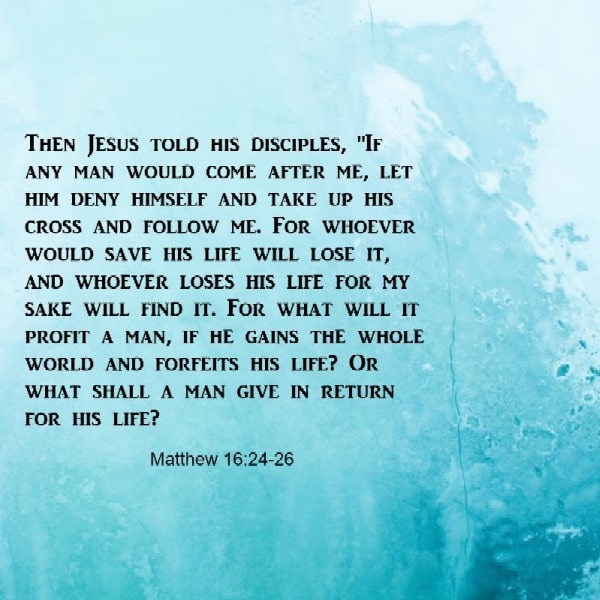
"If any man would come after me" that is, if anyone among the saved wants to follow the Lord. This someone is a saved disciple who especially wants to follow the Lord. "Follow me" gives the solution to the conditions that are established soon after.
"Deny yourself" To deny yourself means to disrespect yourself or renounce your privileges. Renouncing yourself denotes putting aside your self in order to seek the mind of God, so that in all things you do not follow your own mind or your own centrality. Only this type of person can follow the Lord. This is certainly evident because how can one follow the Lord and follow himself?
"Take up your cross, and follow me" This is much more profound than denying yourself. To deny yourself is only to disrespect yourself while to take up the cross is to obey God. Taking up the cross means accepting whatever God has decided for the person and wanting to suffer according to God's will. By denying ourselves and taking up the cross, we can truly follow the Lord.
"For whoever would save his life will lose it; and whoever loses his life for my sake, will find it" The word life here is "psuque" in the original Greek, which means "soul"; and for this reason this tells us about the salvation or loss of our soul.
"Whoever loses his life for my sake" This is to deny yourself and take up the cross said in the previous verse. Losing your soul is the same as denying yourself. The Lord explains that if for the sake of Him one wishes to abandon all pleasures of the soul and suffer according to the will of God, he will find his soul. This simply means that the one who wishes for the Lord's sake to deny his own thoughts and desires and not be satisfied with the things of the world but instead goes through many sufferings, he will receive from the Lord at another time with blessing and joy what his heart desires.
By studying this verse we must be able to understand what is the meaning of soul salvation. Saving the soul means gaining happiness and joy for the complete satisfaction of the heart. Losing your soul, on the other hand, speaks of losing your own joy, desire and satisfaction.
Matthew 16:24

Continued on verse 25. If you try to cling to your life, you will lose it. But if you give up your life for My sake, you will find it. What good is it to gain the whole world but lose your life? WHAT WOULD MAN GIVE IN EXCHANGE FOR HIS LIFE? Verse 27 The Son of man will come with His angels in His Father's glory and will judge every person according to his actions.
It was not only Christ who had to face the Cross, but His disciples as well.
There is a whole sermon involved in this verse. The Master said: IF ANYONE WANTS TO COME AFTER ME - a rabbinical language for "be my disciple" - he must first renounce himself. "Renounce yourself" is the phrase that is written on the gateway to the Kingdom of God. Every Christian must humble himself, renounce his sins, and deny himself to enter. Then he must take up his cross. This means the death of the OWN-SELF, being crucified with Christ (Rom 6:6; Gal 2:10), that is, a total renunciation of self-will, and a surrender to the will of God. RENDER YOURSELF AND TAKE UPON YOURSELF are in the aorist tense and suggest the crises of conversion and complete consecration. FOLLOW ME is in a present time of continual action and emphasizes the commitment every Christian has to follow Christ, a commitment that should last a lifetime.
"I TELL YOU THE TRUTH: IF YOU HAD FAITH, EVEN THE SIZE OF A MUSTARD SEED, THEY COULD TELL THIS HILL: MOVE FROM HERE TO THERE, AND IT WOULD MOVE. NOTHING WOULD BE IMPOSSIBLE FOR YOU…".
No wonder the disciples wanted to know why they had failed. Jesus informed them that it was because of their LITTLE FAITH.
The deep disappointment Christ felt at the inability of His own apostles is reflected in the words of verse 17. They were pathetic. The disciples had learned so little from Him!
If they had faith like a mustard seed they would have commanded the mountain to move from here to there and it would have passed. It is likely that Christ was not literally talking about a mountain. By mentioning this mountain He meant “this great difficulty”. Faith does not move physical mountains by some magic, but its own triumphs are more wonderful than large-scale engineering. Faith has already removed mountains - mighty empires, heathen sects and entrenched wickedness.
Verse 20 reaches its climax with this admirable statement: NOTHING WILL BE IMPOSSIBLE TO YOU. But how could this happen? The answer is: "BY FAITH"
He who humbles himself like this child, he is the greatest in the kingdom of heaven. In other words, the main characteristic of a Christian's greatness is humility. Not impressive performance, but humility.
A child's humility mainly consists of a state of trust and dependence. This is the attitude God would have His children adopt toward Him. The modern state of mind that prevails today, of self-sufficiency and of worldly and sophisticated wisdom, is the enemy of an authentic spirituality.
Matthew 18:8
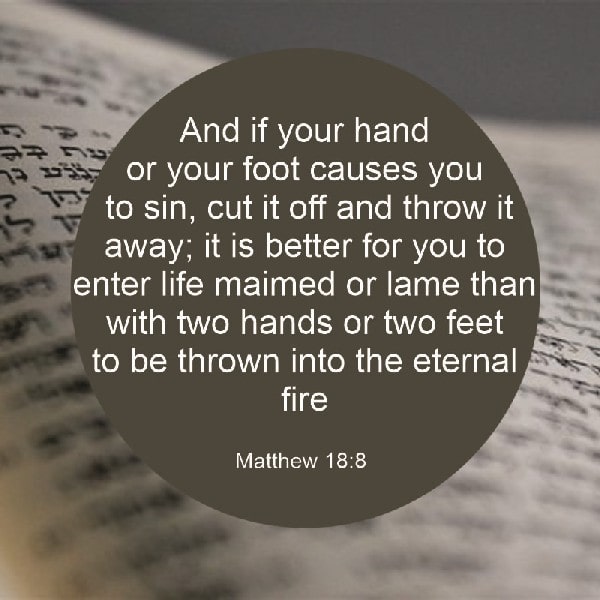
In fact, the foot, hand and eyes represent the person in is various forms of expression. Every time the feet stray from the path, it is because the heart strayed too. A holy personality will have holy feet, hands and eyes. Therefore, Jesus is insisting that the self be rejected in order to become fully sanctified through the cleansing of its sinful selfishness. Only when we become ready for life, and are thus pruned, can we approach true Christlikeness. To renounce what may be our natural right, whether represented by the foot, hand or eyes, would not so easily become instruments of sin.
Three thoughts can be suggested here:
1) the hand is the symbol of what we do.
2) the foot is the symbol of where we are going.
3) the eye is the symbol of what we see.
All must be kept under careful control.
Matthew 18:12-13
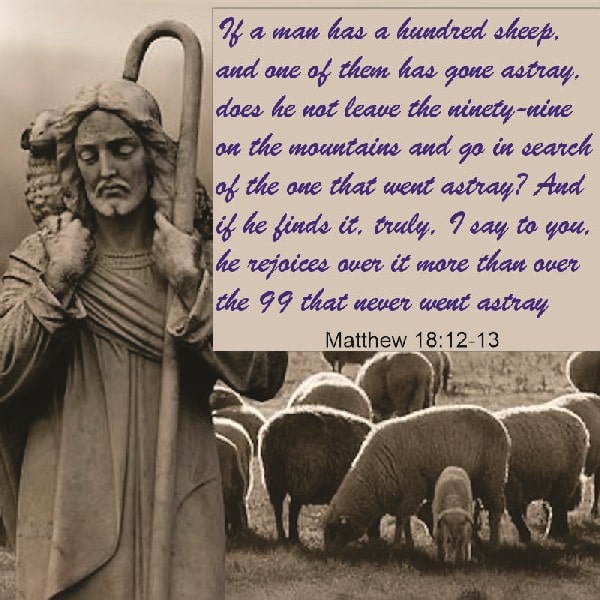
This story, which can also be called the parable of the lost sheep, is also found in Luke 15:3-7. This scenario was very familiar to Jesus' listeners. The shepherd in the east loves his sheep - every one of them. Only a heart full of love can lead a man to risk his life at night in the wild-infested hills, in order to look for a single sheep that has strayed from the herd. BUT LOVE KNOWS NO LIMITS.
When the shepherd finds his lost sheep, he rejoices more with it than with the other 99 sheep that did not astray. Jesus' application of this parable shows that it is not His Father's desire that one of these little ones go astray. "The youngest and sickest of his flock are as dear to Him as the strongest."
This parable gives us an impressive picture of Jesus' own mission on earth. He came looking for the lost sheep. This was His goal wherever He went.
Mateus 18:18

Prayer is the art of the soul that gives itself in adoration and contemplation to God.
Prayer is the path on which the locomotive of God's will moves.
God, in His great sovereignty, decided to limit Himself to the paths that the church provides him.
The more prayer trails, the more God's locomotive will move!
Prayer involves three people: 1. The person who prays, 2. To God to whom the prayer is addressed, 3. The third person to whom many ignore the destruction it causes (to the enemy). Prayer is hard work. It is violent activity. The more prayer there is, the more the devil looses control.
Lack of prayer is the refusal to take the MIGHTY WEAPONS and be involved with God in his battles.
Prayer is the antidote to all afflictions (John Calvin).
What man is, is on his knees before God, and nothing more.
Matthew 18:21

Evidently Peter had been thinking about what Jesus had said about a brother who "sins against you" (verse 15). He wanted to know how many times he had to forgive this brother. He thought he was being very generous when he suggested: up to seven?(21). "Rabbinical law said that no one should ask his neighbor's forgiveness more than three times."
The Master's answer must have been very disturbing: I do not tell you that up to seven, but up to seventy times seven. Some have tried to translate the text as "seventy-seven times". But the traditional translation seems to be the best. Jesus was very fond of using hyperbole, as we have seen in other passages.
It seems obvious that Jesus did not intend for Peter to understand his answer in a strict mathematical sense. He did not mean, "Forgive 490 times and then distance." Rather, He clearly meant that forgiveness should be unlimited. When the Lord said seventy times seven: we can do the math in our minds. But this is heavenly arithmetic: we must do it in our hearts.
This year is just about to end, today is December 27th. How about, giving up that right? Trying to forget about this hurt? Trying to forgive this offense? Remember: NOBODY IS PERFECT. Think how many times you and I make mistakes in our daily lives and God in his infinite mercy forgives us? If I receive God's forgiveness why not extend this forgiveness to the one who hurt me? Think about it… new year… new energy, good energy.
Matthew 18:33-35
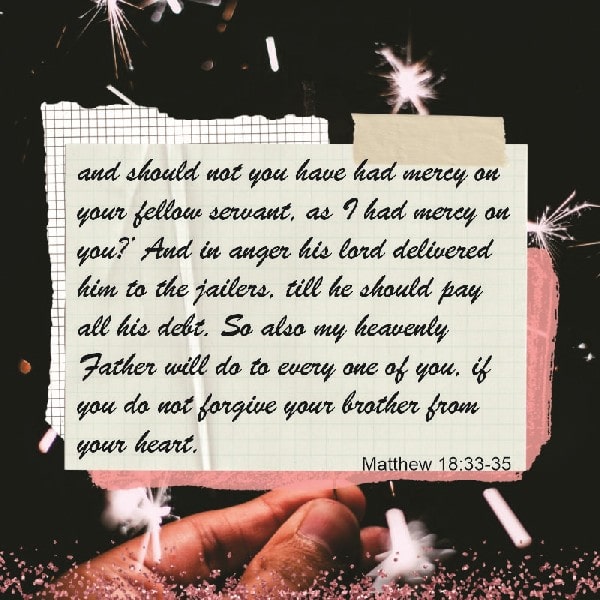
This parable is completed in Matthew 18:23-35. The fact is, a man owed his master 10,000 talents. As a talent was worth around one thousand US dollars, this value reached 10 million US dollars. It was an incredible sum. It could be that Jesus also used hyperbole. What the Lord was trying to emphasize is the complete hopelessness of paying the immeasurable debt generated by our sins until they are forgiven by God. Symbolizing this debt would be impossible, even if these numbers were represented in an absurdly exaggerated way.
But the man begged for mercy and his Lord forgave all his debt. But the forgiven servant, leaving the presence of his master, found one of his companions who owed him a hundred pieces of money. This was a Roman coin, called a denarii. However, this servant grabbed his companion by the throat and demanded immediate payment of that debt. When the servant asked for a deadline to pay, the creditor refused and ordered him to be thrown into prison.
This parable brings a vivid warning to every Christian. Every believer received forgiveness of an incalculable debt of sin, which he could never repay. However, some professing Christians hold a grudge for years against a fellow person because of an insignificant word or deed that may have been spoken or performed out of innocence or ignorance. TEACHING IS TO FORGIVE FROM THE HEART; that is, granting true forgiveness. That means "FORGIVE AND FORGET"! A person cannot harbor hatred in his heart and be a true Christian at the same time.
Loving parents brought their children to Christ, TO LAY HANDS ON THEM AND PRAY. It seems that it was customary to take Jewish children to the synagogue to be blessed by the rabbis. Marriage is sacred as are children.
The disciples resented this imposition of hands and harassment of their Master. They reproached those who brought the children. They thought, it was of no importance, as do some church workers today. But Jesus' attitude was very different. He said: LET - allow, consent - THE LITTLE ONES AND DO NOT HINDER THEM - do not keep them from - COMING TO ME. The Lord greatly appreciates receiving them. Then He added: because of such is the Kingdom of Heaven. "Love, simplicity of faith, innocence and, above all, humility, are the ideal characteristics of little children, and of the subjects of the kingdom."
Matthew 19:16

Matthew 19:16 - The young man had broken the first commandment, because "mammon" had become his main god.
This young man's statement - ALL THIS I HAVE KEPT (v20). Only Matthew adds - WHAT DO i STILL LACK? It seems clear that he was dissatisfied with his religion, and felt that something was missing inside.
Jesus was happy with the young man because he kept the commandments and said: if you want to be perfect, go sell everything you have and distribute to the poor. In this young man's case, this perfection was too much. That is because money, not God, was his main purpose in life.
Discipleship requires giving up everything in the name of Christ. For most people this does not mean giving up all material possessions. But in order to be fully sanctified (1 Thess 5:23) all people must renounce what is dearest to them so that God can truly take first place in their lives. Bohoeffer writes, "Is there any part of your life that you are refusing to give up? Perhaps some sinful passion, some animosity, some hope, perhaps your ambition or your intuition? If so, it should not surprise you that you are not full of the Holy Spirit, you have difficulty in praying, or because your request for faith remains unanswered."
Refusing to resign, the young man withdrew literally sorrowful (v22). He was dominated by a conflict of interest. He wanted to obey Jesus, but he also wanted to enjoy his riches. That last wish was stronger and won.
Which decision wins by you??? To win is to win yourself!
Once I heard a Bible study teacher say that Matthew 20:16 means that many are called or given an opportunity to do something for the Lord, but very few are willing to take responsibility for responding to that call. God's call does come with responsibility, but it also comes with rewards. Possible every one is called to a special purpose. Hopefully you say yes to the Lord.
Matthew 20:30

There are moments in life that you cannot stay with contained and polite prayers before God. There are situations that need more, it is necessary to claim. They were blind, the situation of a blind person today is still difficult, but back then it was much more. Then they started SCREAMING! To the point of telling them to shut up, and they SCREAMED LOUDLY. Their cry got the Lord's attention. He said: WHAT DO YOU WANT ME TO DO? And so are we, we need to insist, cry out, scream for help in our moments of prayer. And their response was quick and clear: Lord, may our eyes be opened (v33). Moved by intimate compassion, Jesus touched their eyes. Jesus felt their affliction, it was sincere, it was true… Perhaps this act had as its main objective the strengthening of their faith, and not just the cure. And they came to see, and seeing they followed Jesus. In this way, the crowd increased as the Master made his way to Jerusalem to offer himself as the atoning sacrifice for the sins of all mankind. HE THAT HEALED THE BODY CAME ESPECIALLY TO HEAL THE SOUL OF MEN.
Jesus cursed the tree as a sign of God's displeasure with hypocrisy.
What was the lesson? There were actually two. The first was a vivid warning against hypocrisy - having the leaves of a false profession of faith, but no fruit of God's grace. One application was the nation of Israel, whose people professed to be God's children, but who denied that condition through their sinful conduct.
The second lesson is written in verses 21 and 22. Jesus solemnly declared: TRULY I TELL YOU THAT, IF YOU HAVE FAITH AND DO NOT DOUBT, you can do not only what I have just done, but also much greater things. Then He gave one of the most remarkable promises in the Bible related to prayer: AND WHATEVER YOU ASK IN PRAYER, BELIEVING, YOU SHALL RECEIVE. This expression may seem like the granting of unconditional authority; a free hand. But there is an important condition - BELIEVING. No one can really believe anything that is against God's will.
What you really desire - if your desire merges with the desire of Christ and your Father - you will receive as long as you present that desire before the throne of grace.
This text brings some lessons, the most important is that NOT ALL WHO ARE CALLED WILL BE SAVED. Many are called - salvation is of universal provision - but few are chosen. It is not because God rejects men, but because men reject his call. There is no place here for the idea of an "efficient call". One can reject God's call to salvation, and thus become lost.
Matthew 22:21
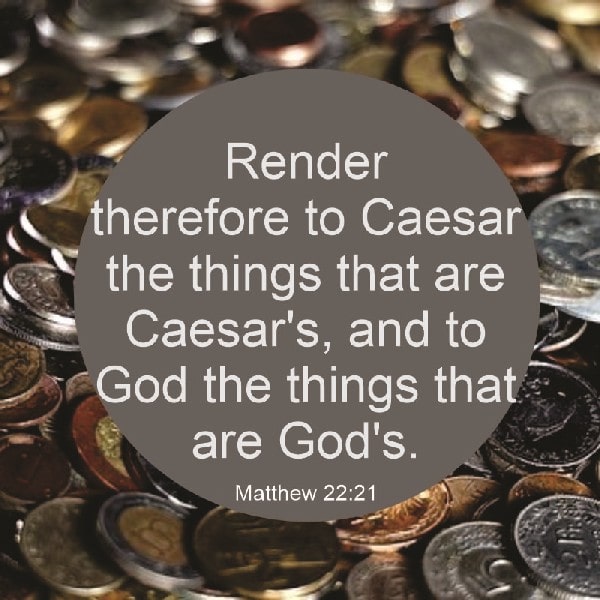
The Pharisees used a sneaky manner (v15). The flattering approach used by these men was totally false. They tried to catch Jesus off guard, suggesting that He always spoke the truth and did not care what people thought of Him. They hoped in this way to lead Jesus to incriminate himself by making an unwise statement.
So they set the trap: Is it lawful to pay tribute to Caesar, or not? (v17). This was an individual tax that the Jews found particularly offensive as they reminded them that they were subject to foreign power.
If Jesus answered "yes," the Pharisees would expose him to the public as a disloyal Jew. If he said "no," the Herodians would denounce him to the government of Rome as guilty of sedition.
Jesus, knowing their malice, said: Why put me to the test, you hypocrites? Christ counterattacked by making a request: Show me the money for the tax (v19) - Jesus asked: Whose likeness and inscription is this? The immediate answer was: "From Caesar."
Then, the Master uttered a simple and profound order: RENDER TEHERFORE TO CAESAR THE THINGS THAT IS OF CAESAR AND TO GOD, WHAT IS OF GOD. The verb to give literally means "to give back". If the denarius bore the name and figure of Caesar, it must have belonged to him, and therefore what belonged to him must be returned. Paul reiterates this principle in Romans 13:6.
But must we also give back what belongs to God - and what do we have that He has not given us? But giving God his due means more than giving tithes — and including additional gifts as well. WE MUST RETURN TO GOD THAT WHICH HAS THE IMAGE AND NAME OF GOD - THE SOUL. Those who had come to question Jesus returned in wonder.
Matthew 22:29

What happened in this story was that a group of Sadducees, who were a Jewish sect at the time, showed up to question Jesus about the resurrection, which they themselves did not believe. The historian Josephus speaking of this group says: But the doctrine of the Sadducees is this: That souls die along with bodies; they disregard the observation of anything beyond what the law prescribes for them.
So the Sadducees proposed a hypothetical and very unlikely situation. Seven brothers in succession married the same woman, but all died childless. Finally, the woman also died. Now, the Sadducees asked, at the resurrection, whose wife will she be of the seven? That is the kind of question small minds like to ask to annoy sensitive people.
So Jesus caught their attention immediately. He said: YOU ARE WRONG, BECAUSE YOU KNOW NEITHER THE SCRIPTURES NOR THE POWER OF GOD. The only way the church and individuals can be saved from sin today is by knowing both. True orthodoxy can only be preserved through a careful and constant study of God's word, alongside an experience of the power and presence of the Holy Spirit.
The Master went on to say that there is no marriage in the future life, but they will be like angels in heaven, that is, immortal and non-reproductive.
- Hypocrisy is the act of pretending to have beliefs, virtues, ideas and feelings that the person does not actually have. It is often required that others behave within certain parameters of moral conduct that the person goes beyond or fails to adopt. The word derives from the Latin hypocrisis and the Greek hupokrisis both meaning the representation of an actor. In this time in which we live, hypocrisy is one of the greatest evils of human social behavior. The internet and social networks are the stage where many appear to act.
James 5:12 says: Let your yes, yes, and your no, no, lest you fall into condemnation.
Matthew 23:27

Jesus was saying: To walk over a tomb caused defilement, which should be avoided by all who wished to enter the temple (Num. 19:16); hence the custom… of painting graves with lime on the 15th day of the month of Adar (March - April), before Easter. Jesus was pleading for something better than a Whitewashed Christianity, which was excellent on the surface but full of sinful attitudes.
The main fault was a lack of inner sincerity. Their justice was totally superficial; therefore it was just a decoy. She was later condemned on account of her exaggerated piety in trivial things, for being only a front for neglecting such important principles as judgment, mercy, and faith. If we are to escape this strict condemnation, our ethics must be deeply solid and our hearts genuinely holy. We must have an inner beauty, always and first in the eyes of God, even if we cannot achieve, at times, a perfectly beautiful outer conduct. Such spiritual purity requires a sanctified savior, and the constant presence of the Holy Spirit dwelling within us.
Matthew 24:7b

- The prophet Zechariah predicted that a great earthquake will divide the Mount of Olives in two when Jesus returns (Zech 14: 3-5). The prophet Isaiah said that the earth will tremble in its place at that moment (Isa 13:13); the prophet Joel said that heaven and earth will tremble (Joel 3:16); and the book of Revelation says that there will be a great earthquake that has never occurred since man exists on earth (Revelation 16:18). skyscrapers and bridges will fall, islands will sink into the sea. Entire mountains will fall to the earth and the house will shatter and fall.
- BUT WHAT HAPPENS TODAY? In the early 20th century, between 1900 and 1910, there was only one earthquake that measured 6.2 or more points on the Richter scale. Between 1950 and 1960, there were nine. There were already 125 in just five years, between 1990 and 1995. And if you do a search on Google now, you will see that from December 2020 to March 2021 we have 1 gigantic earthquake per month in the world. And each year, scientists say that a "major earthquake" is on the way. (Somewhere in the world, possibly in California, Israel, the fault lines are known, it is unknown when).
- Various signs are vivid reminders that the Great Tribulation period is approaching. And the fact that these signals are occurring simultaneously makes the event even more certain.
- There is overwhelming evidence about the occurrence of these things - false christs, wars, famine, pests and earthquakes - that would be difficult for anyone to deny. This evidence requires the most serious consideration possible.
- God is sending a message to the world every time an earthquake hits the earth. He is using their frequency and increasing intensity for us to say that the Great Tribulation period is approaching and that we need to be prepared for eternity after this life on earth.
Matthew 24:9

- Verses 1 and 2 of Matthew chapter 24 deal with the prophecy that is fulfilled: the destruction of the temple in 70 AD. Verses 3 to 8 deal with the prophecy that is always being fulfilled: false Christs that will remind us of labor pains, war, famine, pests and earthquakes. Here, the word then signals a change in the Mount of Olives sermon. Verses 9 to 51 deal with future events: the Great Tribulation period, the sSecond Coming of Christ, the judgment. Although those who accept Christ after the Rapture will be affected by these things, the events described in these verses refer mainly to Israel and the Jews.
- During the Great Tribulation, nations will hate Israel and besiege Jerusalem. As far as Christians and Jews are concerned, those who refuse to receive the mark of the Beast might be killed.
- And today? When conservative Christians express Biblical views that are opposed to correct ones, they are criticized as petty extremists and enemies of world peace. The hatred of Christians and Jews will accelerate considerably and will include terrible acts of betrayal and violence. We have seen samples of this hatred for the world, with Jesus, with the apostles, with many Christians since the beginning of the Church; we also see today in various countries hostile to the gospel, arrests, tortures and deaths. But the Lord said in Matthew 24:13 : but whoever endures to the end will be saved.
May God bless us and we can stand firm in any circumstance.
Matthew 24:14

- Christians are sending the gospel of grace to the whole world by electronic means, using the internet. Some of the largest Christian ministries report more than a million hits per month to their website. Clear evidence holds that the gospel of the Kingdom can reach everyone in our time.
- In 1993, the gospel of grace was broadcast around the world, 24 hours a day in different languages.
- In 1995, Billy Graham preached to everyone the gospél on television, 70% of the world's population had the opportunity to hear it, interpreters were hired, and an estimated 1 billion people heard it in their own language.
- In 1996, with the assistance of 1 million pastors and churches on all continents, Billy Graham preached again to the entire world, it is estimated that this time 2 billion people listened.
- he Bible has already been translated into more than 3,800 languages in all nations, tribes and dialects around the world. Electronic communication conveys the message of hope in Jesus Christ to everyone.
- This is another sign that Jesus is coming soon and we have to prepare ourselves!
Good Morning! Pray: Come, Lord Jesus Christ, Come!
Matthew 24:24

- Some ask: why would anyone follow the Antichrist, false messiahs or false prophets? When Jesus walked the earth, He performed great miracles and what Hhe did attracted large crowds. John said, "Many saw the miraculous signs He was performing and believed in his name" (John 2:23). This is one of the reasons why so many people will make this terrible mistake. They will be victims of religious deception supported by signs and miracles.
- The Bible contains many warnings about corruption in the church at the end of times. Many seminars will create games and the truth will be stifled. They will train spiritually bankrupt pastors with seductive ideas more dangerous than poison stew. The following list identifies five characteristics of false prophets:
- Instead of stating what the Bible says, they will either ignore it or condemn it.
- Instead of meticulously citing what the Bible says, they will use non-Biblical sources for their messages or will misquote it intentionally. False translations from the original Hebrew and Greek text.
- Instead of denouncing sin as the Bible shows, they will redefine it to be politically correct or popular.
- Instead of saying that the way is narrow or that Jesus is the only way, they will say that there are others, or many ways.
- Instead of having the motivation to serve God with personal character and integrity, their motivation will often be to serve a system for money, applause or worldly success.
- Undoubtedly, God can perform signs and miracles. But Satan and his multitude of false Christs, sorcerers, mystics can do very impressive things too and will be in full force at the end of times.
- During the Great ¨Tribulation, the antichrist will manifest himself with all power, with signs and with deceptive wonders (2 Thessalonians 2:9). The false prophet will perform great signs, and demons will perform miraculous signs to bring together the leaders of the world for the battle of Armageddon (Revelation 16:16).
- We have to study the Bible every day, become familiar with it, know what is written, so that we are not easily deceived.
Matthew 24:32-33
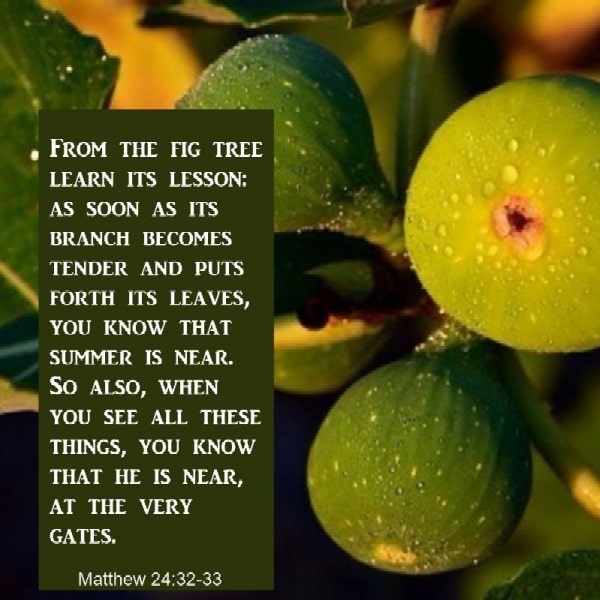
The prophet Jeremiah used good figs to represent the good Jews who had been taken captive to Babylon and used bad figs to represent the bad Jews who had escaped captivity. The prophet Hosea compared the ancestors of Israel (Abraham, Isaac and Jacob) to the first fruits of a fig tree. Therefore, Israel is the "fig tree" of the Bible. And Jesus, in fact, was saying, "Pay attention, Israel: When you see all these things happening, understand that the end times are near."
In fact, all of the events in Matthew 24 revolve around Jerusalem. Jerusalem and Israel are the point of reference for anyone who wants to know what time it is on God's prophetic clock. In Matthew 24, our Lord is saying, "Keep your eyes on Israel."
The disciples asked, "When will the sign of your coming and the end of time be?" (Matthew 24:3) Jesus said that the sign of His coming will appear in heaven and that we will know that the end times are near, at the door, when we saw Israel's rebirth and all these other things happening. This tells us that we must look at the situation as a whole and not just an isolated event. So, the increase in earthquakes, the increase in wars, the increase in diseases in addition to all the other things that are indicators. The Great Tribulation period cannot begin without a seven-year deal that guarantees peace for Israel. Half the Great Tribulation cannot come without a rebuilt Jewish temple. There will be false Christs, but the Antichrist only comes when Israel is in place.
Jesus gave us these signs. He wants us to understand Him and to know what they all mean at the same time.
Mateus 24:40
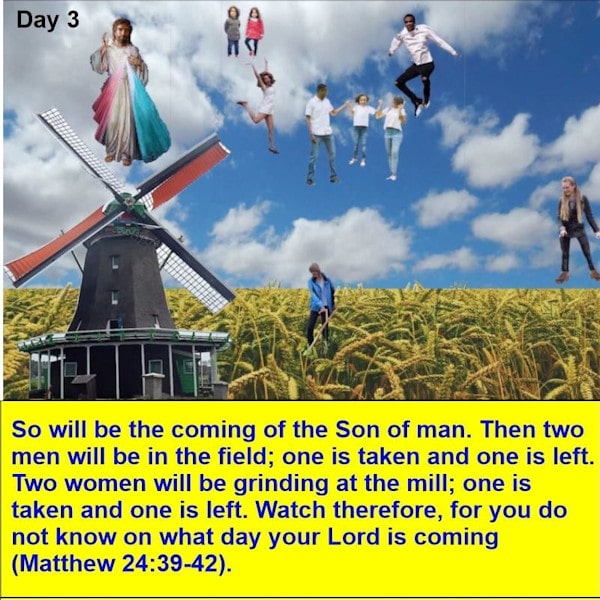
- The warning in the verses is that the BELIEVER (verse 42: LORD, so the people who believe in Jesus Christ) does not know when the Lord Jesus Christ will return.
- For the believers who recognize Jesus Christ as LORD in their lives, He determines what the believer does, so live under the control of the Holy Spirit (= oil in Matthew 25).
- For THOSE believers, the Lord Jesus Christ comes to take them up to Heaven: THE RAPTURE OF THE CHURCH.
- The believing Christians who live in the world and are NOT under the control of the Holy Spirit (the foolish virgins who had insufficient oil) are left behind and passes through the Great Tribulation where their faith will be tested.
- In the Great Tribulation, those left behind will have to choose whether or not to accept the 666 mark. Acceptance is no pain, no oppression when the choice is for the Beast, Satan and eternal death. To refuse the mark is pain and oppression BUT eternal life with God.
- Now is the time to choose:
- complete surrender and living to the glory of God or
- enjoying the worldly life and being left behind.
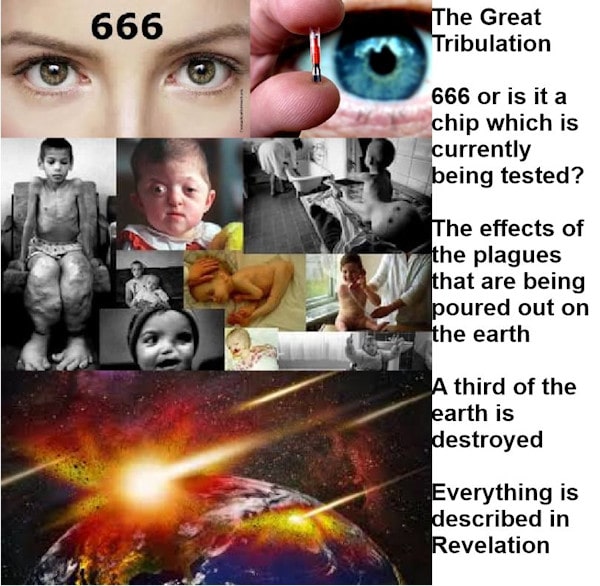
Matthew 24:42

Of that day and hour no one knows (Mt 24:36) Those who predict dates for the coming of Christ are definitely ignoring the scriptures.
The time that will precede the Coming of Christ will resemble the days of Noah (v37). People were leading normal, secular lives, ignoring God. But suddenly the flood took them all away. Thus, Jesus said, will also be the Coming of the Son of Man.
The human race is basically divided into two groups - those who watch, waiting for the Coming of Christ, and those who do not.
WATCH, FOR YOU DO NOT KNOW WHAT HOUR YOUR LORD SHALL COME. This is the main point of the Sermon on the Mount. WATCH literally means: "Be fully alert!" For no one knows when Christ will come. BEING PREPARED FOR CHRIST'S RETURN IS THE FIRST DUTY OF EVERY CHRISTIAN.
- To which group do you belong?
Yesterday, day 3, the difference indicated: - Be taken or
Be left. - Matthew 25 explains when the believer is taken or left.
- The foolish virgins had insufficient oil and had to buy oil with the result that when the Bridegroom (Jesus) came they were not ready and did not go into the wedding hall. After they bought oil, they went to the marriage feast and found the door closed. Explanation: they were left and found the Rapture into Heaven closed.
- The wise virgins had enough oil, image of the Holy Spirit. Their oil feed their lamps (the Holy Spirit controls/feeds the life of this believer) and were ready when the Bridegroom came (the believer who lives spiritually and is ready at Christ's first Coming) and enter the marriage feast with the Bridegroom, they are accepted and go to Heaven with Jesus.
- Watch therefore, for ye know not the day nor the hour.
Matthew 25:6

This parable is in Matthew 25 and is well known to most. The story is that 10 virgins were waiting for the bridegroom. No bride is mentioned, for in the spiritual teaching of the parable, virgins take the bride's place.
At midnight a cry was heard: Here comes the bridegroom! All the virgins arose and began to prepare their lamps.
In desperation, the foolish turned to the wise, asking for oil: BECAUSE OUR LAMPS ARE OUT. The Greek text literally says THEY ARE FADING OUT. This is a much stronger truth, and a much broader warning. There are many Christians who have not yet lost all their spiritual life, but whose lamps are getting dimmer. They need to realize that they are running the risk of being in outer darkness, just like the mad virgins.
The wise virgins rejected the request. At first glance this seems selfish. But giving away oil could possibly mean that they themselves would not have enough. But from the standpoint of the spiritual truth being taught here, this attitude was inevitable. The clear intention here is, "He tells us that all men must live by their own faith." God's grace is not transferable from one human being to another. Each must keep their own stock.
Since oil is a recognized example of the Holy Spirit in both the Old Testament and the New Testament, the suggestion is that we must be filled with the Holy Spirit if we are to be properly prepared. Every man needs all the grace of God that is available if he is to do all the will of God and be prepared for the return of our Lord Jesus Christ.
Mateus 25:15

God can use the most humble of His children, when in the past He used simple people to free His people, what He could do with any member of his people today, in this era of so much knowledge, fast transportation, mass communication, etc?
"What is that in your hand"? (Ex 4: 2).
Remember: every Christian has at least one talent. Therefore, each one has to do what he can with what he has, while he has conditions, and leave the results to God: "And who knows whether you have not come to the kingdom for such a time as this?" Esther 4:14
Every Christian has received the Holy Spirit, Who gives each at least one talent, while the Lord Jesus Christ went away (= Heaven). Then He will come back and will ask every Christian to give account (Matt. 25: 31-46, 1 Cor. 3: 10-18).
Matthew 25:16-18
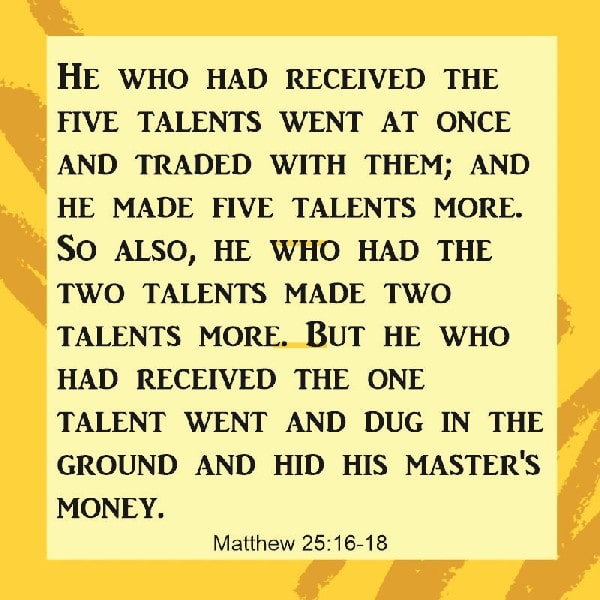
The fact that this word is actually used as a reference to one's personal ability gives added meaning to the parable.
The man who had received five talents doubled them, as did the man who had received two. But the one who had received a talent dug a hole in the ground and hid his lord's money. This is often true in church circles, on occasions when a person thinks he has only one talent and buries it instead of using it in God's Kingdom work.
When the lord returned, he settled accounts with them. The reward he had promised was based on faithfulness, not skill. It is extremely significant that the two servants were praised for being good and faithful rather than for being capable and intelligent. Here are two solid, honest virtues that we can all have - both the poor and the rich, the uneducated and the brilliant intellectuals alike. These are the only two things that God requires of any person—that he be good in character and faithful in service.
Matthew 25:34

Continuation: v.35 - For I was hungry and you gave me food, I was thirsty and you gave me drink, I was a stranger and you welcomed me, I was naked and you clothed me, I was sick and you visited me, I was in prison and you came to me. V37. TThen the righteous will answer him, "Lord, when did we see thee hungry and feed thee, or thirsty and give thee drink? And when did we see thee a stranger and welcome thee, or naked and clothe thee? And when did we see thee sick or in prison and visit thee?" And the King will answer them, 'Truly, I say to you, as you did it to one of the least of these my brethren, you did it to me.'
- Works of mercy are not the only thing that eternal rewards and punishments are based on. But can a man read these words of Jesus and believe that a Christian should be carefree and inactive while his fellow men are in need?
- We should particularly note that eternal and perpetual are translations of the same Greek word - aionion, "which belongs to the ages". In verse 46 it speaks of eternal torment. The torment is as eternal as life. One who believes in eternal happiness must also believe in eternal sadness.
- It is the sin of omission, not the sin of commission, that brings condemnation and eternal punishment. This is the main teaching throughout this chapter. The door is closed to the foolish virgins because of their negligence; the servant without initiative is expelled, for being of no use, because he does nothing; and those on their left will be severely punished for failing to see the many opportunities afforded them to show kindness.
Then came a woman - John identifies her as Mary (Martha's sister) - with an alabaster jar. The anointing took place in Bethany in the house of Simon the leper. Simon was a very common name and this man may have been healed by Jesus of the leprosy that afflicted him.
Alabaster, that is, an alabaster jar for anointing, a vessel with a long neck that was broken when its contents were to be used. The ointment was of great value. This ointment could have represented her life savings. She poured it over Jesus' head.
Notice this woman did not have an appointment. She just "showed up"! THERE ARE OCCASIONS WHEN COMMON SENSE FAILS.
She poured it over Jesus' head (imagine the scene). She did not apply it drop by drop as one would normally use an expensive perfume. Instead she broke the narrow bottleneck and with love and devotion poured its contents over the Master's head. THERE ARE CERTAIN THINGS THAT NEED TO BE DONE WHEN THE OPPORTUNITY ARISES, OTHERWISE THEY CAN NEVER BE DONE.
The disciples were indignant at this waste. John 12:4 tells us that it was Judas Iscariot who made the criticism. Matthew states that the disciples thought of the material aspect. They did not catch the fragrance of Mary's devotion, symbolized by the perfume.
But Jesus defended her act. THE FRAGRANCE OF AN ACT OF LOVE LASTS FOREVER. He said: She "has done a good deed to me". They would always have the poor - history proves it - but Jesus would soon be gone.
For her love and loyalty, all over the world, what she did for His memory will also be referred to. Millions of copies of the Gospel, in thousands of languages, tell this story, wherever the gospel has reached. As she gave her all, Maria's name became immortal.
Matthew 26:40

At that moment Jesus was in the garden of Gethsemane. The name Gethsemane means "oil press". The Mount of Olives was naturally a suitable place to extract the olive oil that was used at that time as fuel for lamps, food, and healing ointment.
Jesus left eight of his 11 disciples at the entrance to the garden. Taking only his innermost circle — Peter and the two sons of Zebedee — He walked into the olive yard and opened his heart to these closest companions. He said: My soul is filled with sorrow until death. It was the weight of the sins of the world on his shoulders that was crushing him. He begged: Stay here and watch with me. But they failed. Many times we have friends with whom we can share our pain, they listen to us, give us solidarity, lend a shoulder so we can cry, but they only go so far. It is difficult for anyone to pay the price in prayer for you.
JESUS WAS A LITTLE FURTHER, not just physically, but spiritually. If He had not gone a little further, we might not be saved. And unless we too go a little further - in merciful and consecrated service - many others will not be saved either.
When Jesus returned the three disciples who were supposed to be watching were asleep. The Master rebuked: THEN COULD YOU NOT WATCH WITH ME FOR ONE HOUR? And Christ gave another warning: WATCH AND PRAY THAT YOU ENTER NOT INTO TEMPTATION. This is a warning every Christian needs to heed, every hour of every day. “Eternal vigilance is the price of freedom”. This is true in the military field, and it is true spiritually.
Matthew 27:3,4 JUDAS' REMORSE - When Judas saw that Jesus had been condemned by the Sanhedrin - and this verdict was irrevocable - he was sorry. The verb is not metaneo, "to change your mind", but rather metamelomai, "to regret". He regretted the consequences of his act of betrayal, but he had no genuine repentance for his sin. Returning to the chief priests and elders, he took the 30 pieces of silver. THIS MONEY BURNED IN HIS HANDS.
To the religious leaders he made this confession: I HAVE SINNED, BETRAYED INNOCENT BLOOD. But he received neither comfort nor help from them, who, in response, only said to him: WHAT DOES IT MATTER TO US? THIS IS WITH YOU. If spiritual leaders spoke this way to their people, it is quite clear that things were very bad with Judaism.
Judas could no longer bear the sight of illicit gain. Literally, “throwing the silver coins into the sanctuary ”— then he withdrew and went to hang himself.
Let us be careful, many Christians around the world wanted to bring justice to their localities by getting involved in political issues, and when they saw what is done in the lives of their brothers in the form of persecution and violence they had the same feeling as Judas, remorse. Let us pray that we may understand and hope for God's justice on earth.
Matthew 27:22

We can record the words of a song: "WHAT WILL YOU DO WITH JESUS? NEUTRAL YOU CANNOT STAY." No human being can remain neutral in relation to Jesus Christ.
Jesus said in Matthew 12:30, "Whoever is not with Me is against Me, and he who does not gather with Me scatters."
In this passage Pilate is in a situation where he sees no fault in the person of Christ that leads to his death. So he asks that question to the angry crowd, perhaps, thinking that the answer could end up being another. Since they asked for Barabbas' freedom. Pilate still wanted to know why people wanted Jesus to be crucified, but the crowd stirred and shouted, "Crucify! Crucify!"
Today, every day we are placed in debates or decisions in which we have to decide: Jesus? Or Barabbas (that which is spacious, but satisfies the desire of the majority who often do not know the person of Christ). I know that choosing for Christ is right. It is fair. But will I disagree with the majority? Friends? Relatives? How do we currently say BE CANCELLED? For those who love and know Jesus it is not difficult to choose. But for those on the fence, beware! Neutrality can kill you, spiritually speaking.
Matthew 27:55-56
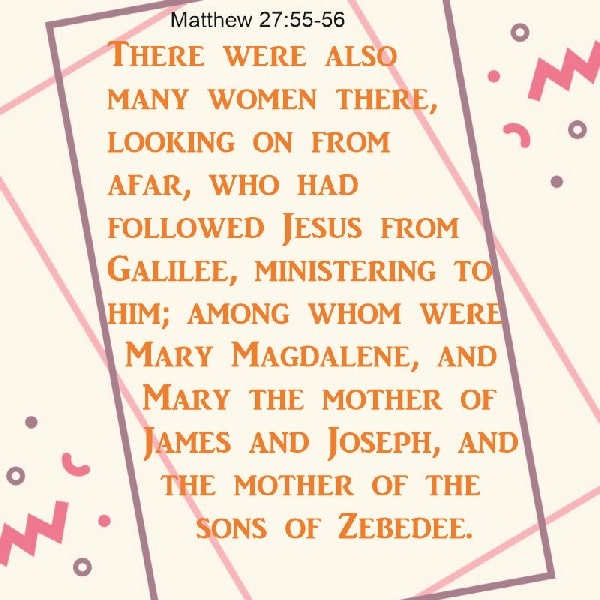
In sharp contrast to the vile attitudes and actions of the Jewish leaders around the Cross are the reactions of the centurion and these women. With loving devotion they had followed the Master from Galilee to serve (diakonousai). Here may be the beginning of "women's ministry" - the female diaconate - in the Christian church. The men had fled in fear (26:56). It were the women who stood before the Cross. What a comfort this must have been to Christ!
Mary Magdalene is mentioned here for the first time in this Gospel. Her name indicates that she came from Magdala, on the western shore of the Sea of Galilee. Jesus had cast seven demons out of her (Luke 8:2), and she was filled with gratitude to Him. Her deep devotion made her the first to be in his empty tomb on Easter morning, and the first to see Jesus after his resurrection (John 20:1-18).
Have you ever wondered what your purpose in life is? Know that you are called by God to teach others about who Jesus is and what it means to follow him. God has given you the authority to do this and has promised not to leave you alone, but to be with you always. Ask God to show you where He wants you to go — talk to someone in your office, in your neighborhood, or maybe even in your family — so you can help others follow Him too.
Always do this with Love and under the guidance of the Holy Spirit.
Matthew 28:19

A missionary was among the savage Africans preaching the gospel. In the first year, there were dozens of conversions in the tribe. The chief and the sorcerer were also converted. Once, talking to the missionary, that leader, in tears, confessed his sadness at not having known Christ any longer. Unaware of the word of God, he had sacrificed nine children to the spirits he thought were good and would give rain and prosperity to the tribe. Now, how I would like to be with these children by their sides so that together you can enjoy the Lord's company.
Those tears come to us today. There are multitudes who have not yet heard of Christ. They are at the mercy of darkness. Do not you want to be a preacher of the Good News? Can you hear the cry of people without Christ?
Let us pray: Lord, help me to be faithful to Your call. Give me the freedom to contribute to the growth of Your work and enable me to speak about You to others. Amen.
Matthew 28:19-20

Have you ever wondered what your purpose in life is? Know that you have been called by God to teach others about who He is and what it means to follow Him. God has given you the authority to do this and has promised not to leave you alone, but to be with you always. Ask God to show you where He wants you to go - talk to someone in your office, in your neighborhood, or maybe even in your family - so you can help others follow Him too.
Matthew 28:19-20

Deep within your heart is a great desire for your family, friends, and acquaintances to enjoy the love and salvation that is in Jesus. However, you often feel overwhelmed by the spiritual needs that surround you. How can you reach the lost? How can you impact this world with God’s love and presence?
Remember that you are not alone! THE LORD PROMISED TO BE WITH YOU UNTIL THE END OF THE WORLD. He accompanies you and in Him you are capable. He called you and sent you on a mission, but remember that He has not left you alone. God holds your hand, gives you the right words at the right time, and fills your heart with His love. Proclaim today the hope and Salvation that you have in Jesus.
For this is what the Lord commanded: "I have set you to be a light for the Gentiles, that you may bring salvation to the uttermost parts of the earth" (Acts 13:47).
Let your light so shine before men, that they may see your good works and give glory to your Father who is in heaven (Matthew 5:16).
However, it is not limited to winning people to Jesus as Savior. The task is: Make disciples and teach them to observe all that Jesus has commanded. This means that people will read and study the Bible and pray. Accept Jesus as Lord and show in their daily lives that they belong to the Lord Jesus Christ.




